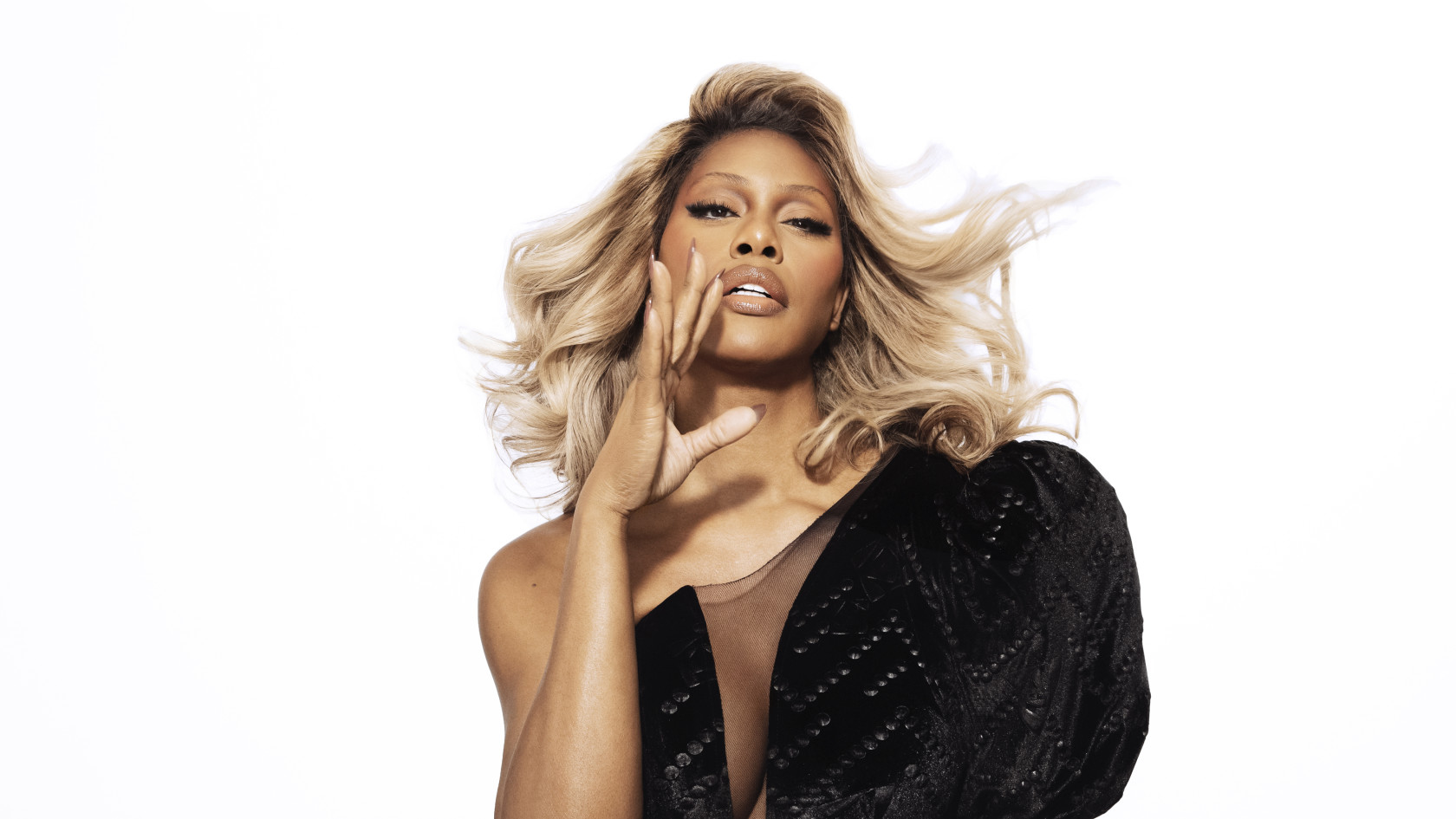
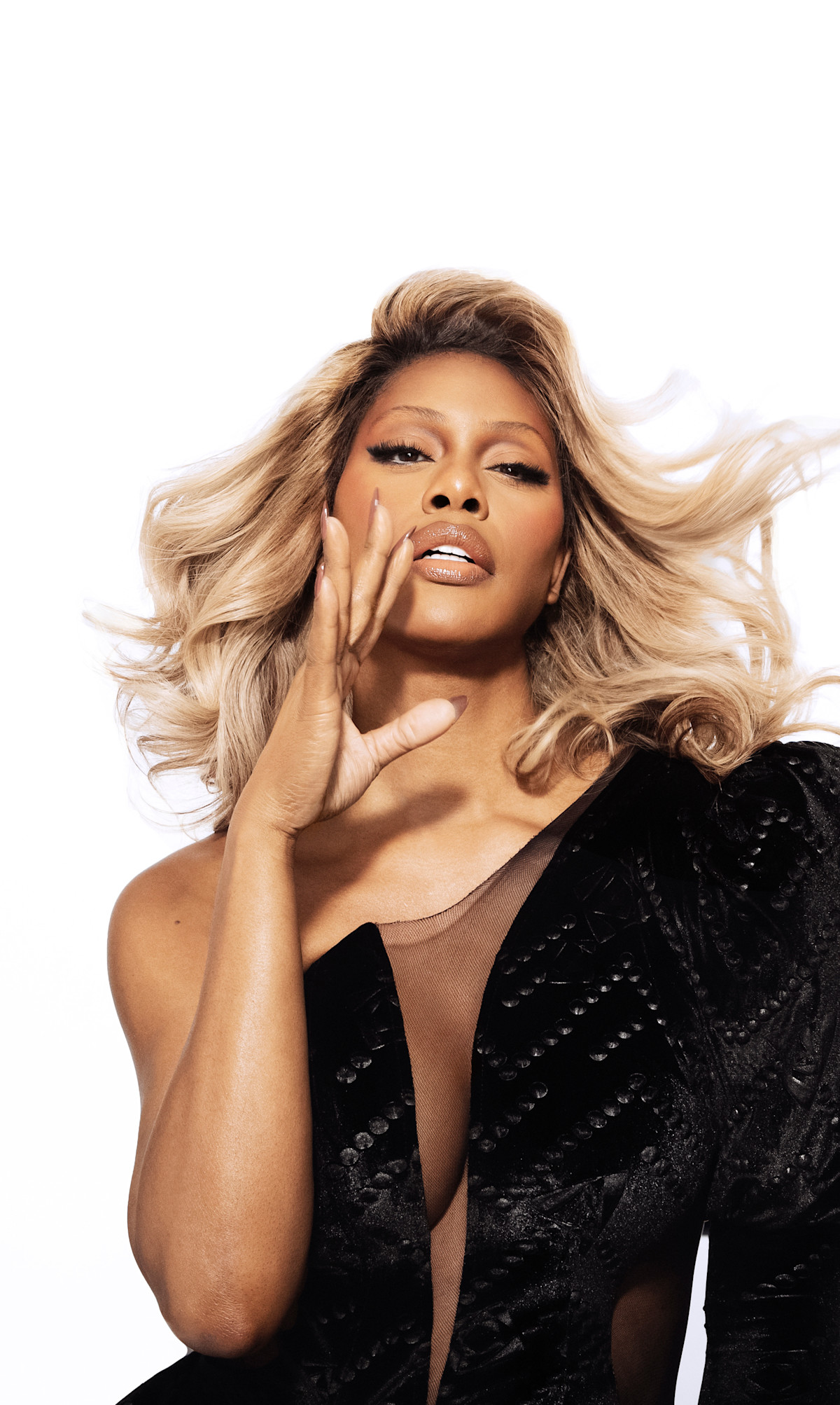


LAVERNE COX
Sly Art
Actor, Advocate, and Producer Laverne Cox Breaks Barriers, Changes Rules, And Blazes Trails---With An Artful Eye And A Message In The Name Of Change.
PHOTOS BY MARC BAPTISTE WORDS BY TAMARA RAPPA
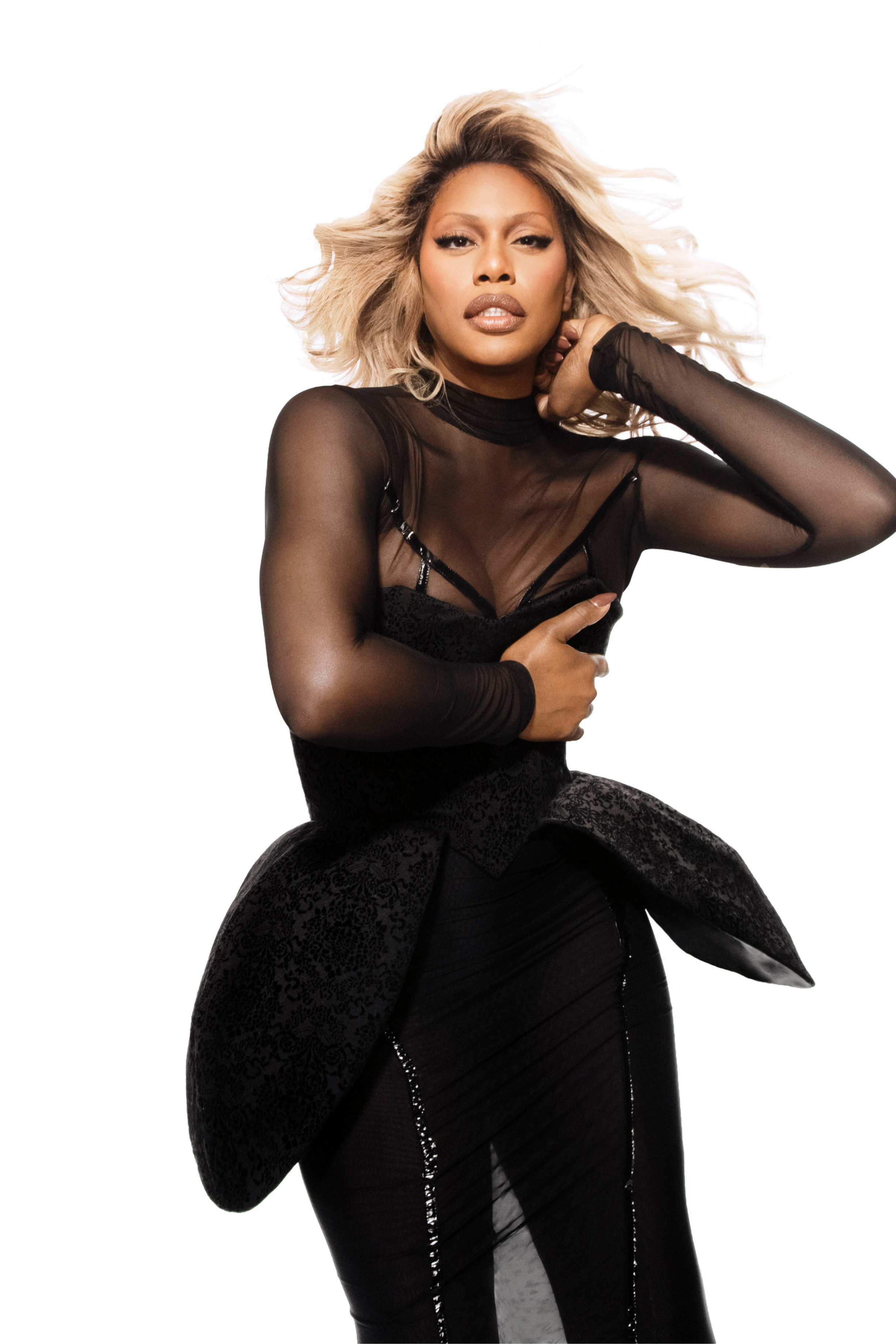
ABOVE PHOTO: Edwing D’Angelo Dress. THIS PHOTO: Edwing D'Angelo Blouse, Bustier, and Skirt.
Listen to the extended interview on episode 98 of the Story + Rain Talks podcast on Apple Podcasts, Spotify, or wherever you listen.
Tamara Rappa: Does anyone else in your family have artistic talent, like you do?
Laverne Cox: My brother. I have a twin brother who is a musician. He plays the piano. He sings. He writes songs. When we were growing up he was also a visual artist, so he drew and painted very realistically from an early age. He won every art competition you can win on local, state, and national levels. He went to the San Francisco Art Institute and started there as a painter, and then eventually moved into sculpture and installation. He did a year of graduate school at Yale University in visual art, dropped out, and started a rock band.
TR: Of course...
LC: Of course, as one does. And he's been doing music ever since. He's traveling now. He performs in Europe all the time. I think he's in The Hague or Germany next month. Also, my mom danced when she was a kid. She wanted to take dance classes, but my grandfather didn't allow her. So when I begged to take dance classes, she remembered she wanted to do the same thing and couldn't. I think there was probably more artistic talent in the family, talent that wasn't cultivated.
"I feel like I've only scratched the surface of what I'm capable of as an actor. I'm looking forward to plumbing the depths of my soul, my psyche, my traumas---for new characters in the future."
TR: Growing up in Mobile, Alabama, how and when did you discover your creative talents?
LC: They were always there. As early as I can remember, I danced all the time, and I didn't need music. There was music in my head. Then I started seeing dancing on television, and would imitate what I saw. During the late seventies and early eighties, it was the age of Fame, of dance. There were great shows like Dance Fever, Star Search, Solid Gold, and Soul Train. Every time there was dancing on TV, I would watch and imitate what I saw. I finally started studying dance in the third grade through a program called Culture In Black And White, an arts program for low income kids in my hometown. I started studying around eight or nine years old. I've been creative my whole life.
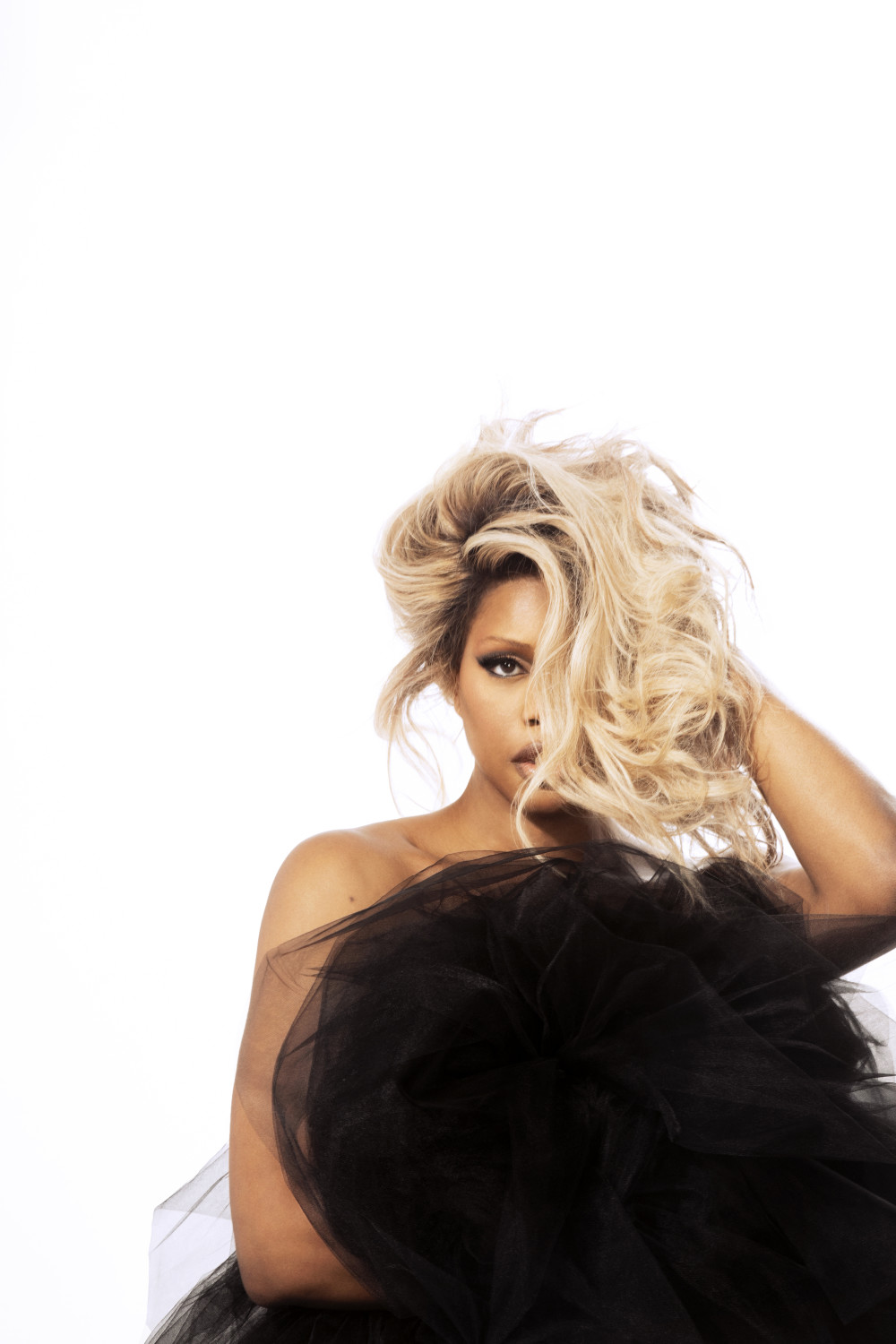
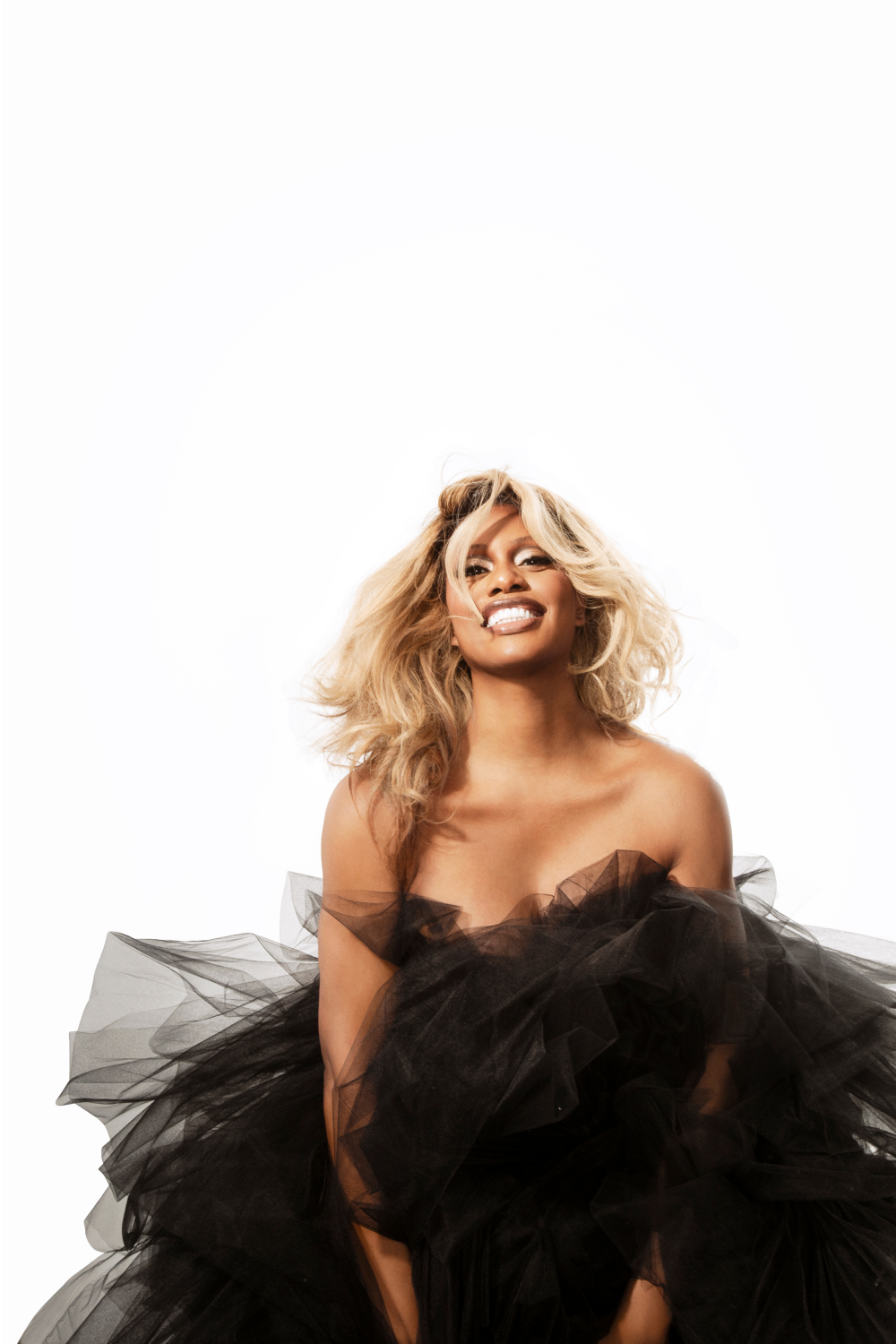
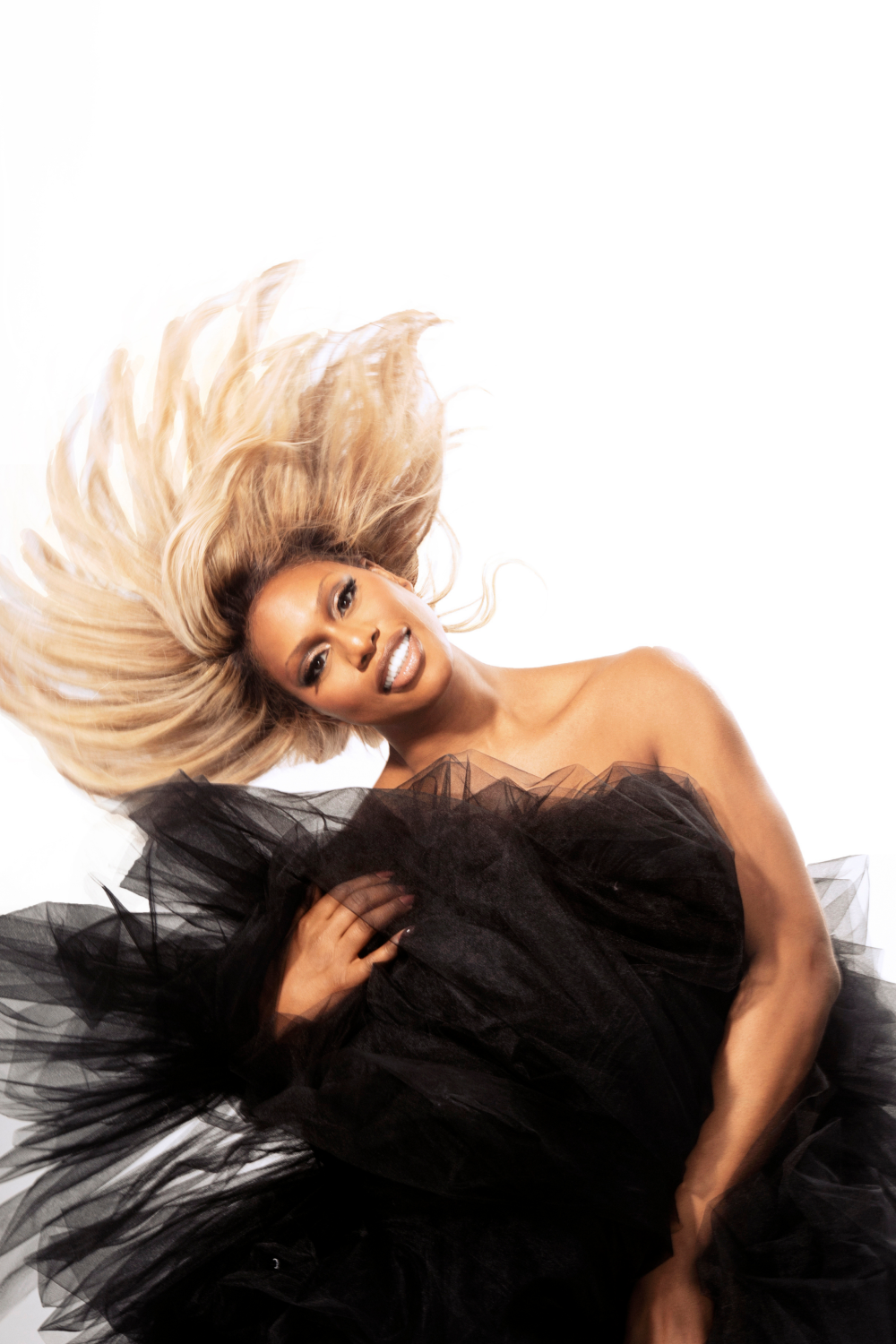
Edwing D’Angelo Skirt.
TR: During that era in time, there was this romantic dance culture being portrayed on the screen. Even someone like me, going to public school in Queens, was buying jazz shoes for fashion and dance gear at Capezio. There was a real dance moment that was happening in pop culture.
LC: Remember Staying Alive with John Travolta, and leg warmers? Dance was mainstream. Flashdance and Footloose were kind of pivotal for culture. Footloose was a huge moment in terms of the music videos, the soundtrack. And I was a kid at that time, who wanted to dance, who always loved dancing. There was a whole thing to support my love of dance in pop culture that I would argue...doesn't exist now.
"Even though I'm still mostly associated with it, I'd consciously said I want to create a brand that is bigger than the show. I have things to say and I have talent, and I want to keep working past this show. I didn't know that we would go for seven seasons. I didn't know."
TR: You eventually made your way to New York City from Mobile where you attended Marymount College, and you worked at hot spots Coffee Shop and Lucky Cheng's. I know them well and frequented them often! What did you guys do at Lucky Cheng's when someone had a birthday? Send out a drink in a chocolate shoe?
LC: Oh my God, so many things! I remember, there was a drink called Pink Pussy and it was kind of this big flaming bowl of alcohol. It was literally on fire, and people would sort of communally drink out of it, which sounds insane given this pandemic! And we had a chocolate shoe that we would give to birthday people. And people would get their drag boss, which is a drag queen lap dance. It was such a crazy environment. I started working there when I left my job at Coffee Shop after ten years, in 2004. The World Room was in the back, and they shot episodes of Sex And The City at Coffee Shop, if you recall. Then, they started a Coffee Shop Lounge, past The World Room, it was this very chic lounge. At one point in that lounge I was on line for the bathroom, and Grace Jones was on line too. She goes into the single occupancy bathroom with me, does cocaine and pees in front of me, and asks for liquid eyeliner. It was so epic. Everyone knows Grace Jones does cocaine, so I don't think I'm spilling any tea. It was one of the best pre-celebrity moments of my life: Grace Jones peeing in front of me and doing cocaine in front of me. I did not participate. I have never done drugs to this day.
TR: She asked you for liquid eyeliner, the most epic part of that story.
LC: The whole thing was everything. I live for Grace Jones. I'm obsessed with her to this day, everything about her. Just everything. I live.
TR: What was pre-celebrity life like back then, being in New York City as a performer, going to school? What were you immersing yourself in, what was inspiring you creatively?
"In 2007 when the first openly transgender person had a recurring role in a prime time television show, I saw that and thought, this is it. This is the moment. This is the moment for trans people. So I created these postcards that said, Laverne Cox Is The Answer To All Your Transgender Acting Needs."
LC: Things shifted so much during the timeframe of 1994 to 2014, in my first twenty years living in New York and becoming famous. When I got to New York I was a student at Marymount and a transfer from Indiana University. I was a dance major, but I was really into performance art. I discovered a singer named Diamanda Galás, who had shows in the city, and I was really into Meredith Monk. I was into opera, but I was also into this very avant-garde vocal stuff and performance art. It was the early nineties when performance art was a whole thing, and there was an open mic I went to every week, called Surf Reality, on the Lower East Side. I did these performances that were a combination of modern dance and avant-garde vocals. That's how I entered New York. In the very avant-garde performance world, even though I was a dance major at Marymount.
TR: New York was the best then.
LC: It really was. I would go to Blacklips Performance Cult at Pyramid Club, Anoni's legendary Monday night party, and I worked at a place called Stingy Lulu's. Then I evolved from performance art to, at the time we called it, Genderfuck; very androgynous. Around 1997, I did the Ice Queen Pageant at Pyramid Club; I did fem drag for the first time, and it was so fully freeing. I realized I'd been running from my trans-ness and from gender nonconformity because I'd internalized so much transphobia. I started leaning into being fem, and in 1998, I started my medical transition. My life was a lot of night clubs. In the nineties it was Webster Hall, Disco 2000 at Limelight, and Tunnel. There was Crowbar and Cake. There were all these really cool, Lower East Side, East Village places where I would hang out. Chelsea was the hood for mainstream LGBTQ. When I started transitioning, I started going to places like Lot 61. I started going to mixed clubs. They were mixed, but mostly straight. I never had problems getting into clubs back then, because everyone knew me from Coffee Shop, and all of the club promoters would come there at the end of the night. As I transitioned, I wanted attention from men, and I was not getting attention from men in gay clubs. For me there was the club scene and I was always auditioning, and I went to fashion school when I started transitioning because I wanted to be an actor and perform, but didn't see any trans people in the mainstream doing that. Around 2000, I went to FIT for three semesters and studied fashion merchandising. Then I dropped out. After that, I did a movie, then got another movie. Randomly I would get these auditions, I'd book things. And then a woman I worked with at Coffee Shop named Candace Edmondson was in this class with Susan Batson, the famous acting coach, and said to me, 'You should come to this acting class.' That class changed my life. It's what really made me take acting seriously. Susan's coached Nicole Kidman, Juliette Binoche, Jamie Foxx; she has this huge celebrity clientele. She had a studio where she invested in young talent and eventually I got a scholarship to be an intern there. Her philosophy on acting is that if you commit to the work and find the humanity in a character, you can shift people's understanding of themselves and of the world. Art has power. Real acting deeply steeped in humanity and empathy could shift the world--- and that shifted me. I committed to her process. It was very difficult. There was a lot of sense memory work. I had a lot of childhood trauma that was coming up that I hadn't dealt with. I routinely vomited in acting classes. I was tapping into a lot of things. Roberta Wallach, who was one of the teachers at Susan's studio, Eli Wallach's daughter, said to me, 'You need to be in therapy.' I was in her developing-your-own-method class, and I committed. All this deep, dark trauma was coming up. It's what made me commit to therapy. I thought, 'I want to be an artist. I want to be serious, and what's required, is for me to use myself and my trauma, and my pain and joy'.

Edwing D’Angelo Skirt.
TR: In the beginning, there was your appearance on I Want to Work for Diddy. How did that opportunity come your way and what do you remember most about that experience? It was a huge show at the time, one that everyone was talking about.
"At one point in that lounge I was on line for the bathroom, and Grace Jones was on line too. She goes into the single occupancy bathroom with me, does cocaine and pees in front of me, and asks for liquid eyeliner. It was so epic. Everyone knows Grace Jones does cocaine, so I don't think I'm spilling any tea."
LC: That happened because of Candis Cayne, who became the first openly transgender person to have a recurring role in a prime time television show. In 2007, I saw that and thought, this is it. This is the moment. This is the moment for trans people. So I created these postcards that said Laverne Cox Is The Answer To All Your Transgender Acting Needs. I felt like a door had been opened and I was going to try to walk through the door. I created five hundred postcards that had different pictures. I'd done a film with this guy who was French, he lived in the United States for twenty five years but kept his French accent, and did voiceover work. He told me, 'I send postcards to casting directors and agents every six months so they remember who I am.' I remembered that, so I sent my own postcards out, got four meetings, and one of them was with my manager to this day, Paul Hilepo. At the time, I was saying yes to everything. I was on Craigslist; I was on Backstage; I was on Actor's Access, submitting myself for everything including reality shows. I submitted myself for Big Brother, and I had a conflict and so couldn't go to the audition, but they liked me and kept my information on file.
"One of them kicked me, and I called the police. This group of young black men had attacked me. And the next day, I was doing an interview to be on a show about working for a hip hop mogul. I knew this could be a really powerful moment, a moment of being of service."
So when I Want to Work for Diddy came along, casting reached out. It happened because I was saying yes to everything and putting myself out there. When I went in for the audition interview for I Want to Work for Diddy, I didn't want to work for Diddy, but it was about what I learned from Susan Batson's studio, about building relationships with casting directors---especially if you don't have an agent. Then they liked me, and all of a sudden it was a serious thing. I was like, 'Do I want to do this?' Everyone, my brother, my best friend, my manager---all said I shouldn't do it. Basically, they said, and they had every reason to believe it, that it was going to be an exploitative thing. Whenever trans people get on a reality show or on television, it's going to be exploitative. And you have no control over how you're going to be represented. It could be a disaster. The day before my final interview for I Want to Work for Diddy, I was assaulted on the street. There was a group of young men who were catcalling and calling me the F word and other anti-gay slurs. One of them kicked me, and I called the police. I wasn't injured, but this group of young black men had attacked me. And the next day, I was doing an interview to be on a show about working for a hip hop mogul. I knew this could be a really powerful moment, a moment of being of service. I remember saying to the executive producer, who was a black man, that I didn't want to be exploited. I think this could be a really powerful moment, but I'm not here to be exploited. I'm not here to be a spectacle. And I was as serious as a heart attack. And he said, on my word, as a black man, that's not what we want to do here. Diddy does not want to do that either. Diddy saw your tape and said, 'We can make history with her.' And I took a leap of faith. And it turned out pretty well. We won a GLAAD Media Award for that first season and it led to me having my own show on VH1. Apparently on the show I was the audience favorite, according to VH1. 2008 was a pivotal. I did I Want to Work for Diddy, but before that, I booked my first Law And Order SVU through that postcard mailing. I did my second Law And Order that year as well. I did my first HBO show, Bored To Death. It was a busy year and it was a transformative year for me, in terms of having an agent and having serious television credits as an actor. It would never have happened if I hadn't seen Candis Cayne on television, and believed it was possible for me to be openly trans as a working actor. I always have to give credit to her, because she changed my life. I had to see that it was possible.
TR: What does Candis Cayne say to you today?
"In the beginning when the show came out, the press didn't want to interview me. So I was in full hustle mode. I was in full, I-have-to-capitalize-on-this-as-much-as-possible mode. All I was thinking about, for probably the first three years of the show, was that I had to work to build something."
LC: We've gotten to talk multiple times about it. She's in [my Netflix documentary] Disclosure, and when we did an Instagram Live, she told me, she said so beautifully, 'You were prepared.' I'd been in acting class for years, working on my craft, and learning the business. I'd been doing student films. I was doing everything I could to get in front of a camera or on stage for free. I worked for free for so many years, just so I could act, just to get experience and get better at it. When Candis opened that door I was ready to walk through it. There was more growth I needed as an actor, but groundwork had been laid. I wasn't just some person who hadn't trained.
TR: What do you consider, not necessarily your first break, but the moment in your career when you felt you were on your way to something solid?
LC: I don't know, maybe I feel that now? What's interesting is that I had a few moments that I thought would be breakthroughs. I had a show on VH1 called TRANSform Me, a makeover show that I was starring in and co-producing. I thought that that might be the moment when I would become a star. The show flopped. I did a movie called Musical Chairs directed by Susan Seidelman who directed Desperately Seeking Susan, which came out in 2012. I thought that might shift something, and it didn't. What both of those experiences taught me, is that there may never be a shift in my career, but...can I keep working? I have to figure out how to keep working because I love acting and I want to be a working actor. The shift happened when it was not about a big break or being a star. It happened because I shifted my focus towards the work. And obviously Orange Is The New Black was a major shift in my career. When that happened, I didn't know how long it would last. I was concerned about building a brand that would transcend that particular show. Even though I'm still mostly associated with it, I'd consciously said I want to create a brand that's bigger than the show. I have things to say, I have talent, and I want to keep working. I didn't know that we would last for seven seasons.I didn't know.
"The diversity in the room was startling. I had never seen anything like that on television before, and haven't since. I thought, nobody is going to go for this, because I had never seen it before. And people did go for it, thank God. And that changed my life."
The first season [of Orange Is the New Black] was ten years ago, and there was a moment when we were shooting the rap battle scene; there were over one hundred women in the cafeteria, including background actors and principle actors. The diversity in the room was startling. I had never seen anything like that on television before, and haven't since: women of different sizes and shapes and ages and races and sexual orientations and gender identities. I thought, nobody is going to go for this, because I had never seen it before. And people did go for it, thank God. And it changed my life. When the Orange Is the New Black moment hit, I was in overdrive. I was in student loan debt. I was working my ass off. I was on the road, three or four times a week, sometimes five times a week, doing college speaking engagements, trying to fit that in in between shooting, and doing as much press as I could. In the beginning when the show came out, the press didn't want to interview me. So I was in full hustle mode. I was in full, I-have-to-capitalize-on-this-as-much-as-possible mode. All I was thinking about, for probably the first three years of the show, was that I had to work to build something.
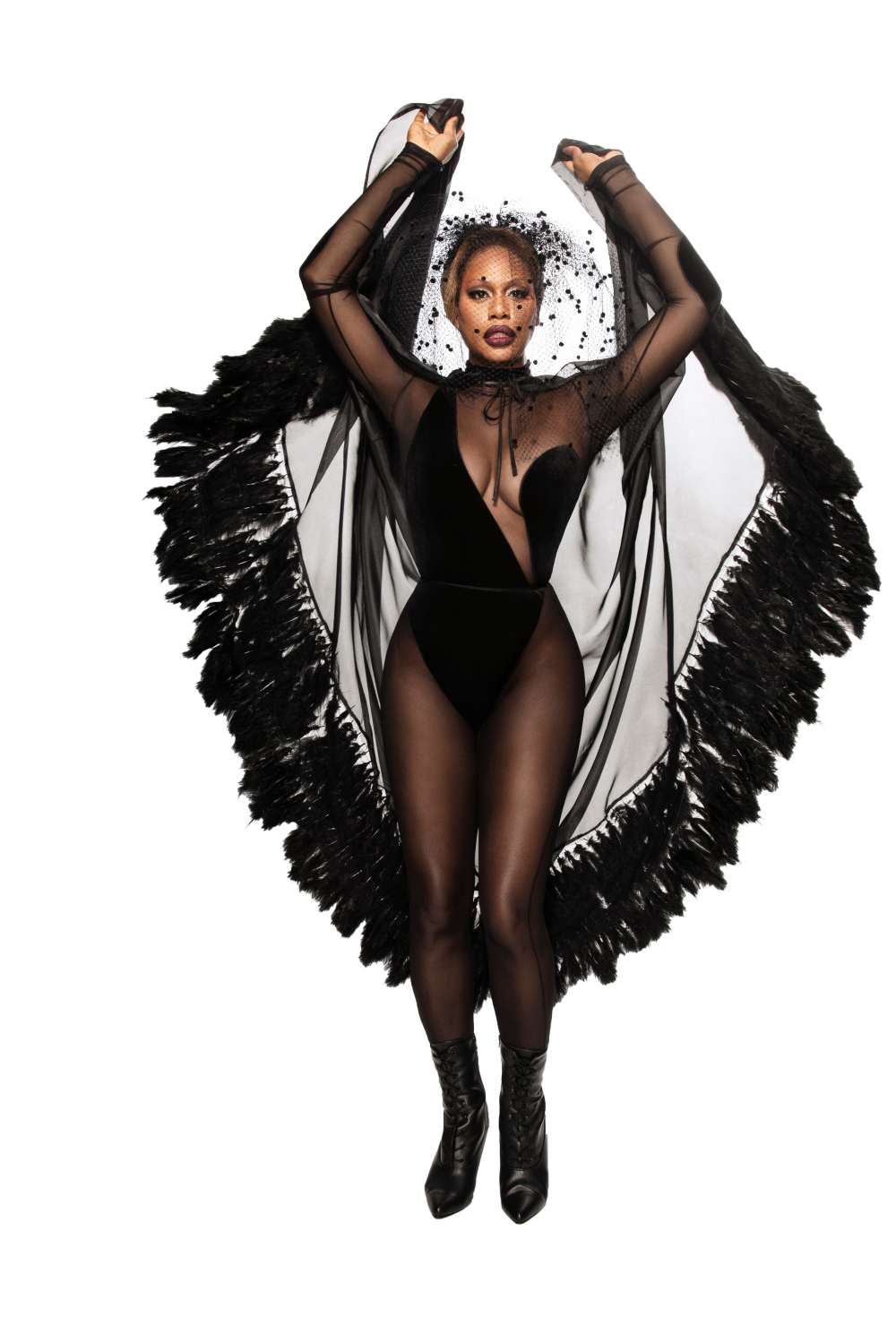

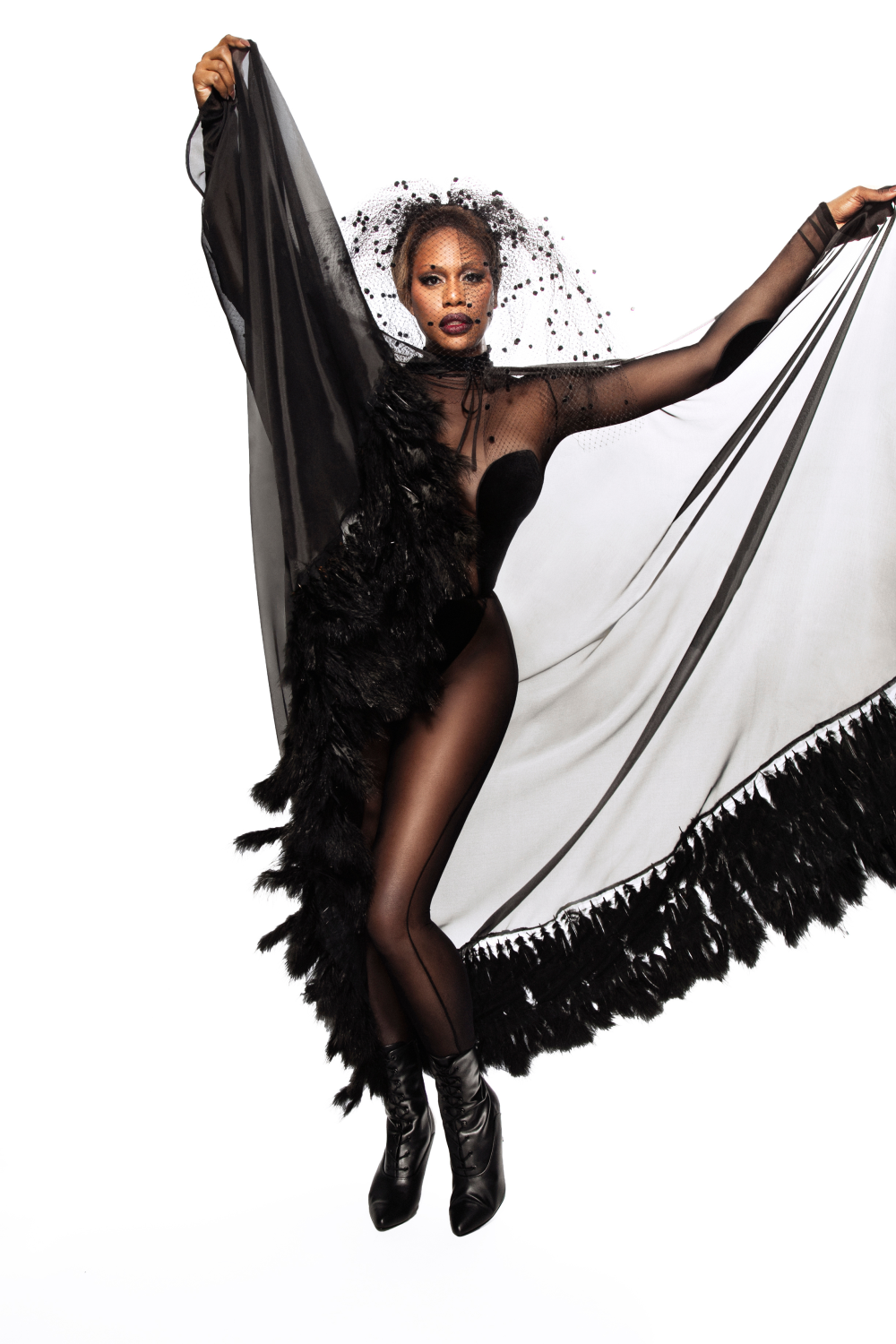
Kokin New York Headpiece; Edwing D’Angelo Cape; LaQuan Smith Catsuit.
TR: To date, you've been in tons of films and series. To name a few, Promising Young Woman, Jolt, Orange Is the New Black of course, thirteen episodes of the series Doubt opposite Katherine Heigl, on the series you played an attorney. Law And Order, The Mindy Project, Curb Your Enthusiasm, The Blacklist, and your latest, Inventing Anna, where the woman that you play is NOT fictitious. Which of your roles do you feel has had the most impact on the audience and why?
"There was a moment after seven seasons, where I thought, I want to do other things, I'm working on other things, I want to be known for other things. And now I'm just so grateful that people still respond the way that they do."
LC: The impact on the audience would have to be my character Sophia in Orange Is the New Black. People, for whatever their reasons, connected to her, to her experience. People love Sophia. There was a moment after seven seasons, where I thought, I want to do other things, I'm working on other things, I want to be known for other things. And now I'm just so grateful that people still respond the way that they do. I have so many favorite stories of meeting fans. In an early moment, I was at BCBG shopping on Fifth Avenue, buying a purse for an event, I think. This woman came up to me, and said, 'Excuse me. Can I speak to you?' And I said, 'Sure.' She said, 'I said to myself that if I ever saw you, I had to tell you this. I'm transgender as well'. She was a black woman. She said, 'I haven't spoken to my mother in five or seven years. And when she saw you on Orange Is the New Black, she called me. And now we're talking again, because of you on that show.' Oh my god! I think about what Susan says about this art form: when you can create a walking, talking human being that people can connect to, can connect to their humanity---maybe that can change some things. I think that's what happened with Sophia in a profound way. I have a lot of stories like that.
TR: What do you love most about your iconic Orange Is the New Black character, Sophia?
"She's like, 'I'm sick of fighting. No one's listening.' I think about Sophia and that moment a lot, in terms of my own life. I think about how Laverne has been fighting, and hasn't given up fighting. I think about how few people are listening."
LC: There are so many talented actresses on that show who deserved attention and magazine covers and nominations, and never got them. So I just want to shout out all of those women because I think it's really important. A lot of people were not able to take the Orange opportunity and do what I've been able to do with it. I'm really grateful for that, though I've certainly worked hard. When you are one of few people who is singled out, there's pressure that comes with it. I have a community to represent. There's a lot I've had to do and say. I think about all the people who must have been frustrated, thinking, 'Why her? I'm just as good. Why not me?' That happens a lot, people are singled out on series all the time, fairly or unfairly. I think about the people who are overlooked. I've been thinking about that a lot over the past couple of years, with me and Orange so I have to mention it. In terms of Sophia, there was a moment, I think in season 6, and spoiler alert! for the people who haven't yet watched Orange, when I'm offered a settlement to get out of prison. That episode was really intense. I have a scene with Caputo; so much of the work of being an actor is about creating relationships. I had lived through all this hell that is Caputo's character, and I get to unleash on him. Sophia is telling him to fuck off and get out of her face. There was a defiance and she was very direct. She was complicated and traumatized, but she had a strength about her and a love about her, a love for her wife, a love for her child---even in the face of all of the trauma. Sophia is a fighter. I think it's season 4, when for most of the season Sophia was in the SHU, in solitary confinement. It was beautiful writing that they gave me, being in solitary confinement, fighting to get out, doing whatever I could to get out. Those are very difficult scenes to shoot. And I go right back...it's so funny how you go right back as an actor, to what you were feeling when you were in it. She was constantly fighting and she never gave up the fight, you know? She was offered hush money. Caputo says, 'You can fight. People will finally listen to you.' She's like, 'I'm sick of fighting. No one's listening.' I think about Sophia and that moment a lot, in terms of my own life. I think about how Laverne has been fighting, and hasn't given up fighting. I think about how few people are listening. I think a lot about that scene, and how it's almost prophetic in terms of where we are right now with trans liberation. Sophia, even in that decision to take the money, was never about giving up the fight. It was about, I can change my life and I can change my family's life. I've had a lot of moments of reflection lately, thinking about all the charity work I've done, both giving money to charities and amplifying charities. And then I thought, 'What about the people in my life?' Most of my closest friends are broke, they are still the friends I've had from before I was famous. Charity begins at home. I started asking my friends and family members if they are ok, if they need something. I'm really lucky that I don't have people in my life who are predatory. None of my friends or family ask me for money. But if they need something and I can give it to them, I absolutely will. It's been interesting to be in this place now, a place where I want to make sure the people around me are good.
"Activism for me right now, in this media landscape, is tricky."
TR: You talked about collaboration and community on Orange Is the New Black. Are there any moments or stories that come to mind besides the rap battle scene?
LC: Oh, so many moments. Seven seasons of moments! There were so many magical moments in the first season. Two come to mind. In the first season there's a scene with the brilliant Samira Wiley and the brilliant Danielle Brooks, both Juilliard alums and friends before Orange, when they're sort of pretending to be white, doing these white voices, and kind of ad-libbing. The way they were going back and forth, they just had such great chemistry. I was sitting right next to Samira, and Danny was across the table, and I was just blown away at the chemistry and how they played off one another's talent. The talent just couldn't be contained. Then, there was the moment when I was shooting my backstory episode with the great Jodie Foster, a dream come true. I still can't believe that happened. It was hour eighteen of shooting on a Friday. We were shooting the scene when I dress as a woman for the first time in front of my wife. Jodie shot that scene from every angle possible. I had rehearsed that scene with Jodie, Jodie played Crystal. She said 'It's in a great place, let's save it for the camera.'. I got comfortable with being directed by Jodie Foster because it was like, 'Oh, she's just an actor like me.' The first few times I met with her, I was shaking and freaking out. She was one of the ones I'd studied deeply. Shout out to Sian Heder who wrote that episode that was beautiful and brilliant, that I received my first Emmy nomination for. Sian wrote and directed CODA, which is currently nominated for an Oscar. Sian wrote that, and is now nominated for an Academy Award.
TR: In an incredibly unique moment, what was it like working with your very own brother to play the role of Sophia?
"I would not have a career if it weren't for people like Shonda Rhimes and Jenji Kohan---mostly women---who have hired me and given me jobs over the years."
LC: My brother played my character, Sophia, pre-transition. I wanted to play Sophia pre-transition, but Jodie Foster, who directed my backstory episode, and I guess, Jenji Kohan, didn't think I was butch enough to pull it off. They didn't know I had a twin brother at the time and were auditioning these black dudes who might play me pre-transition. I told Jodie I have a twin brother and once Jen Euston, our brilliant casting director, found this out, she was like, 'I must meet him.' I found this out years later, before I was even cast, that when they were conceiving of Sophia in the writer's room, there was a running joke that they needed to find a trans actress who can act but has an identical twin brother. She spoke it into existence really. My brother did it for the money, because my brother is a starving artist who does very non-mainstream work and he has very non-mainstream values. He is negro-goth, a term he coined. He needed the money so he said yes, and he was actually quite good. Part of him sort of regrets doing it because when you Google him that's what comes up, not his own work. Now his own work is coming up more. He's never been interested in being in my shadow, in being famous, in being recognized because of me. Being a twin is tricky. When we were growing up people didn't think of us as individuals. People thought of us as a unit.
TR: How does your activism impact your work as an artist and an actor? How does it affect your creativity?
LC: I'm in an interesting place with activism right now. A lot of it is because politics has changed so much. I think about when I was on the cover of Time Magazine in 2014, and how those moments had the power to shift culture in a way that they can't now. I said to my boyfriend earlier today, we were talking about Facebook back in the day and people's posts, that the algorithms weren't so predatory. We're fed the same thing. We're fed the same kind of ideas, over and over again, almost radicalized, ideas reinforced. My activism has been so much about media. The way I've seen my activism, is to use the platform I have to elevate and amplify the voices, stories, and issues that I think people need to know. The nature of my platform through social media, through television, has changed so much because the algorithms have changed so much. Our media becomes an echo chamber for the ideas we already have, and that becomes really frustrating. Pushing up against a wall, preaching to the choir, and people are also so dug in on misrepresenting your point of view. What I've learned, is that no matter what I say, no matter how logical an argument might be---people who think trans people shouldn't exist or don't want to see us on TV or don't want to see us in their schools---will twist whatever you say into their agenda. At this time, there's this legislative attack that's happening against trans children. It's unprecedented, and it's been successful because of the media landscape right now. The right wing has done an exceptional job at propaganda against trans people. It's really disturbing. But it's not just trans people, it's critical race theory. There are all these critical race theory bills in state legislatures all over the country. Activism for me right now in this media landscape, is tricky. There's also a trauma piece around it. I've hit walls multiple times in my activism, when I've been completely depleted and exhausted and falling over and needing to take a break. But 2020 was special. The pandemic really freaked me out. I didn't leave my house for twenty one days straight. I woke up with panic attacks, really scared because we didn't know what this thing was going in the beginning. Then all the protests were happening, and there was an awakening around that. Then, an awakening around violence against trans people. So Black Lives Matter was also like Black Trans Lives Matter. For the first time there was a deep acknowledgement in a way I'd never seen before. It was beautiful. Even as the acknowledgement was happening, we were being murdered in record numbers. Each year outdoes the next, in terms of violence against trans people, and mostly trans women of color. Now I do activism for reproductive rights, which I'm really passionate about. A year ago I hosted the Center For Reproductive Rights benefit, and I've done many events with Planned Parenthood. I'm very pro-choice. But I can't get pregnant. It's not exactly personal for me. It is, but it's not personal for me, like when I see a trans person beaten or trans children having their right to be themselves taken away. That's devastating to me on a level that I can't separate. It's impossible for me to not take it personally.
"I said, 'Are you not attracted to me because of my height and my voice?' He said, 'No, I actually find both pretty erotic.' I asked him to clarify being undateable. It was that my height and my voice made me undateable, because people will know I'm trans."
TR: I was just re-watching Disclosure and listening to you talk about portrayal and violence and the series Nip/Tuck...
LC: It's traumatizing, because I've experienced violence. I've experienced sexual violence. I was chased home from school every day, beaten up. It's trauma. I have fear for my life as a black trans woman. But for the grace of God, for my own mental health, I have to pull back. I'm planning to do something with my dear friend Chase Strangio who works at the ACLU. We're going to do a public event on the internet in a few weeks about all these laws. I can't fully stop because there's so much work to be done, but on some level I have to, because I can't keep re-traumatizing myself. I have a tremendous amount of guilt about it because I have this platform and I want to be of service with it. But you can't pour from an empty cup.
TR: You are a voice, a trailblazer, a barrier breaker. Is there anyone that you want to say, 'FU, look at me now,' to?
LC: For the most part, no. But there is a story. There is this one. I went on a couple of dates with this guy. I think we met on Tinder or something. We went on three dates and then on the third date, there was some very light sexual activity. A week later he has a cold, and thinks I've given him a cold. Then, he freaks out thinking I've given him some sexually transmitted disease. This happens to trans women all the time. I'm in a relationship now, and when I was single I practiced safe sex. I was meticulous about all of my sexual health. I got tested regularly. It was a week later, and considering what we did, the likelihood of anything even being transmitted was really low. We did not make it to home base. We barely slid into third. So he's like, 'Dude, do you have something?' He was freaking out and I was very calm. I was like, 'Well, no, I get tested regularly. Couldn't you just have a cold or something?' He's texting me all of this the week after we hung out. Then he says, 'You're not dateable anyway because of your height and your voice.' By the first date, he knew what my voice sounded like. He knew how tall I was. He knew these things. I said, 'Are you not attracted to me because of my height and my voice?' He said, 'No, I actually find both pretty erotic.' I asked him to clarify being undateable. It was that my height and my voice made me undateable, because people will know I'm trans. I was like, 'thank you for clarifying', and I blocked him, obviously. Literally one year later, Orange Is the New Black came out and I was dating someone at the time, but somehow a message from OKCupid comes up, and it was from him. I opened the message because I'd blocked him elsewhere. His message said that he was so sorry, that he had no experience. Clearly I was the first trans woman he dated. And he told me 'I've had experience with TS's now'... short for transsexuals, very fetishistic. He went on, 'I have experience now, give me another chance'. I blocked him there, too. That moment was a fuck you. All the kids who bullied me, I'm over that. THAT one was a really beautiful fuck you moment. I'm over all the men who screwed me over, who have kept me a secret, I've healed from all of that. This one was particularly egregious. I think a lot of men haven't dated me for similar reasons, but for him to come out and say it so blatantly, so openly, was just unbelievable. If there are any trans women or trans people in general out there reading this: it's not you, it's them. This is the cognitive dissonance that trans women deal with. Often when we transition, we're online, we're on dating apps, and there is a plethora of men who want to have sex with us, especially in big cities, in smaller cities it's probably different. If you're in L.A. or New York or a major city, you're on dating apps and there are hundreds, thousands of men who want to have sex with you. It's like, 'Whoa, okay, there's a market for me.' I didn't know that I would be able to date as trans. I transitioned not for men, I transitioned for myself, not knowing what the situation would be. All of a sudden there are all these men who want to sleep with you, but very few of them want to claim you publicly. It becomes this cognitive dissonance, this mindfuck of, all these men want me but none of them want to claim me. It's maddening. It's confusing. It's important for me to talk about this because I think a lot of trans women are out there dealing with it and are angry, frustrated, and don't know what to do with it. Being famous has definitely changed my dating life, but I've also worked so hard on myself, that I repel that kind of energy now. Men who want to gaslight and manipulate and fetishize me---they learn very quickly--- I'm not the one. I'm on a different energetic field. Keep working yourself and vibrating on a higher frequency and you'll repel all of it, you'll repel it.
TR: Trans representation in the media has come a long way, but what would you like to see more of at this point? What have haven't we addressed yet?
LC: It's a big question. There are more fictional characters trans characters on television, and fewer trans stories that center around trans people. We're the secondary characters a lot of the time, which is great, because that means more trans people are working. Yet fewer shows by trans creators are getting bought and produced. We need more of it. We need more effective media pushback against right wing propaganda happening against trans people right now. I did an episode of my podcast about it with Chase Strangio; there's just no pushback right now. There's all of this unchallenged propaganda about trans people sitting out there, completely misrepresenting healthcare for trans youth, completely misrepresenting trans people in sports, completely misrepresenting trans people in general.
“What it means to be in Shondaland, is care and understanding for life, and that actors are also human beings who have lives."
TR: You've received countless honors and accolades, both for your performance work and also for your activism. You have an honorary degree, an Emmy, you have some SAG awards. The list is long. Which of your honors or accolades over the years has touched you the most?
LC: Oh my. I'm proud of a lot of them. Can I say two? An Emmy has been a dream of mine. Brad Calcaterra, one of my acting teachers I was studying with when I booked Orange, encouraged all of his students to, in the morning, write down five things they were grateful for and five things they were manifesting, and to do it every day. Meditate on it, then take concrete actions to manifest those things. Winning an Emmy was on my list. It's so beautiful that it happened. And I love that it happened because of the incredible young people whose story I was able to elevate through Laverne Cox Presents: The T Word. I'm really proud of it because of the manifestation of it. I'm proud of the work that The T Word has done over the years. By telling these young people's stories, other young people all over the world have seen themselves. Some of them have been able to capitalize on it, and go on. I was so proud that one of the young people, because of The T Word, got a full scholarship to graduate school at Columbia University, and a Tommy Hilfiger ad. I'm also really proud of my SAG awards; the SAG awards I won as an ensemble member of Orange Is the New Black. I love acting so much, I love actors, and it's always been my dream to have recognition from my fellow artists. We know how hard it is. We know what the work is. I remember my first Emmy's show in 2014. The Orange cast were these New York actors, many of us character actors, who have been slaving in New York in near obscurity for many, many years, and all of a sudden we're in Hollywood at the Emmy's, a group of misfits, misfit character actors, being celebrated in Hollywood. It felt really special. I think there were thirty five of us on stage at the SAG awards.
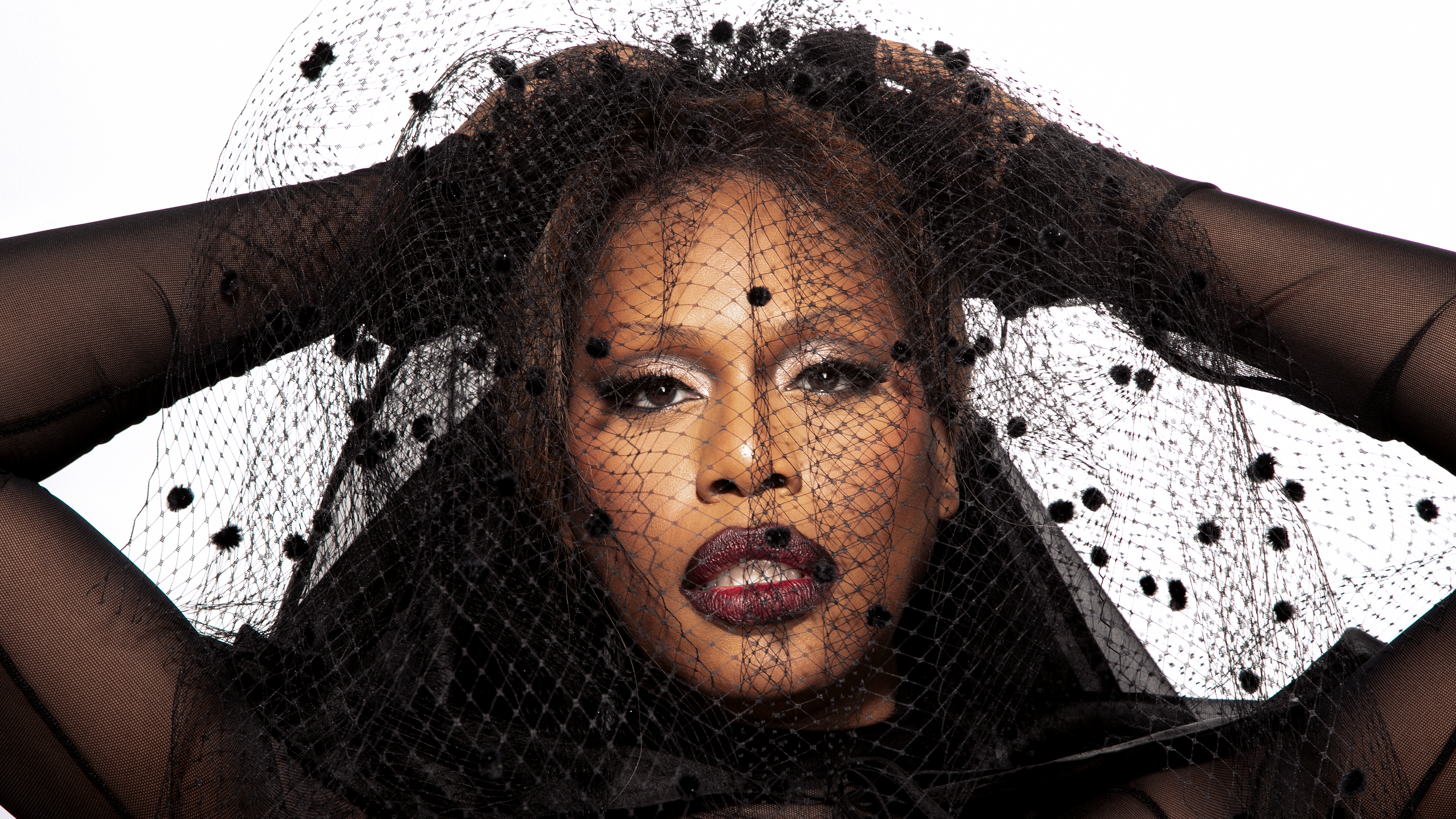
Kokin New York Headpiece; Edwing D’Angelo Cape; LaQuan Smith Catsuit.
TR: You are literally are a Jack Of All Projects: hosting; hosting a podcast; music videos, films, series, advocacy work; producing documentaries. What has been the most powerful documentary moment you've experienced?
"I was just starting to make some money, but I gave them money out of my pocket, just so they would have something. It didn't feel ethical to have people share their stories and not pay them."
LC: Disclosure really is the culmination of so much of my work in the media. My my media work as an actor, as an activist---all came together in Disclosure in this beautiful way. When Sam Feder, our director, and I met, and I saw the research he had been doing for this film, I thought, my God, I've been wanting to do something like this for years." The way it turned out, premiering at Sundance and ending up on Netflix, winning a GLAAD Media Award---everything that's happened, and the impact it's had on Hollywood already, the impact it's had on the world, is a dream come true. I feel like there's a pre-Disclosure and post-Disclosure, in terms of Hollywood and trans people, and in terms of my career. I also have to talk about Free CeCe, the documentary I executive produced about CeCe McDonald, the trans woman who landed in jail for defending herself. I went to St. Cloud, Minnesota to the prison there, to interview CeCe McDonald. I had never been into a prison before. The whole process of making that happen and going to visit her in prison and interviewing her, being present when she was released from prison, hearing her story---there was something incredibly intense and powerful about that moment because I was playing an incarcerated trans woman, because I knew CeCe's story as I went into shooting Orange Is the New Black. I literally thought about CeCe McDonald and other trans women like her who were serving time, mostly in men's prisons, when I was shooting the show. I was very much aware that my role was bigger than me. There was so much that came together when I entered that prison in St. Cloud, Minnesota to talk to CeCe. There was something very, very powerful about that moment for me as a documentarian.
TR: How else have you grown from those experiences, from being behind the camera?
LC: I'm really lucky, particularly with Free CeCe and Disclosure, that I got to work with incredibly ethical, moral directors. On Free CeCe, every time we filmed CeCe, she got paid. There was no budget but we decided we were going to give her money every time we interviewed her, whatever we could. Every person who was on camera, particularly the trans people on camera in Disclosure and Free CeCe, got some kind of stipend. On Disclosure, the whole crew was paid. The interns were paid, everyone on camera was paid. It's important to me to pay, even though people don't usually pay subjects for documentary work. Even when I did The T Word, working with MTV at the time, I was just starting to make some money, but I gave a couple thousand dollars to each of the kids. I gave them money out of my pocket, just so they would have something. It didn't feel ethical to have people share their stories and not pay them. Doing documentaries and making sure that people are paid is really important. I take that piece with me into the work I do now. And I love the interview process. I love finding ways to make people comfortable so that they share on camera. That portion of it is really awesome and fun for me. There were so many moments in Disclosure when our subjects or collaborators would say something and I thought, 'Why didn't I think of that?'
"Taylor [Swift] is an incredible young woman. The way that she's asserted herself professionally and pushed back against music industry exploitation on so many different levels, has been really remarkable."
TR: I loved you as an attorney on the short-lived Doubt. What did you enjoy about that project?
LC: I recently discovered that there is a YouTube channel dedicated to Doubt, but specifically to Peter and Cameron's love story. I played Cameron Wirth, she had this beautiful love story with Peter, played by the wonderful Australian actor, Ben Lawson. I hadn't watched those scenes in years and a couple of months ago I re-watched them. I thought, 'God these are so good!'. I got to do a chemistry test for the first time for that role, because it was between Ben and another actor. The cat and mouse of that love story is so much fun. And now people can watch Cameron and Peter in scenes on YouTube, which is so great. I learned so much on that show. It was the first time I was a series regular, and was in so much of the show that I had no time to prepare. I've always been this over-prepared kind of actor; I know all my lines cold. I had to let go of perfectionism. I never wanted to be the one flubbing a line, and it's okay to flub a line. My experience on the show helped me learn to trust myself more as an actor.
TR: You've also appeared in videos for Taylor Swift and John Legend.
LC: The great thing about the John Legend music video for me was that I'm huge fan. Initially when they approached, they talked to me about a scene where I'm putting on my makeup. It was such a cliche. [Writer, performer, and activist] Julia Serano and other trans women have been very critical of images of trans women putting on makeup. I said, 'What if I'm taking my makeup off?' That was my suggestion, and they loved it. We start with a full face of makeup, then I'm taking makeup off, and I end up with a fully washed face by the end of the scene in the video. I just loved that. It won an NAACP image award. Thank you to the NAACP for that award, and congrats to John on that. And the Taylor Swift moment happened because executive producer Todrick Hall reached out to me. Taylor wanted to do something with the LGBTQ community, and enlisted Todrick to pull together votes from the community. I loved what I wore. The video won, I think, Video of the Year at the VMA's. Todrick and I got to bond in my trailer, and we hadn't really talked like that. The whole experience was really, really special. In getting to know Taylor a little bit, and I've hung out and texted with her since, and she's been so incredibly awesome every time, though I don't think we're friends-friends, Taylor's an incredible young woman. The way that she's asserted herself professionally and pushed back against music industry exploitation on so many different levels, has been really remarkable. I really admire her and I'm grateful that I got to spend a little time with her and be in her video.
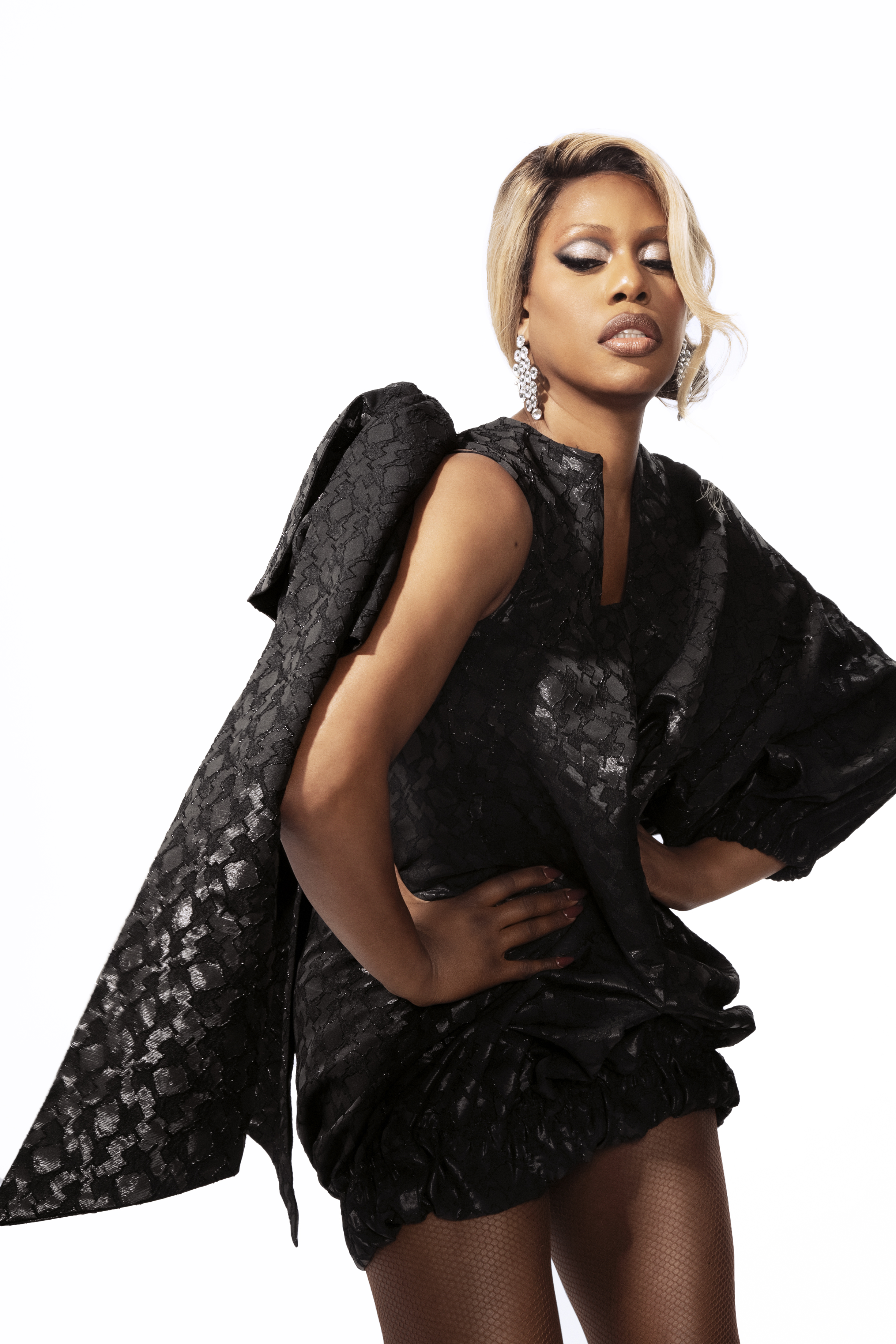
Edwing D’Angelo Dress; Aminah Abdul Jillil Earrings; Nude Barre Hosiery.
TR: What is your creative process like for a role? Is there anything that you do to prepare, and conversely, is there a routine or anything you do upon wrapping a role, or a season, or a project?
"People are singled out on series all the time, fairly or unfairly. I think about the people who are overlooked. I've been thinking about that a lot over the past couple of years, with me and Orange."
LC: Wrapping is interesting. Susan Batson used to call it 'postpartum', particularly when it comes to a play. You have to let go of the character. Some characters are harder to let go of than others. I can't say that I have a ritual lately, I'm just on to the next thing. But in preparation, there are what we call character private moments. A private moment is a very acting school thing, it's about finding the intimacy of the character, the bottom of the character, where you and the character sort of meet. On The Blacklist, we did animal work. Animal work is basically finding an animal that sort of mirrors your character. You really commit to the animal, and eventually humanize the animal. It can become behavior for your character, it can become the voice for your character. I forgot how much I love animal work, we did animal work for Uglies, the movie I just shot. I didn't do animal work for Kacy Duke for Inventing Anna because we had the human animal as reference, Kacy Duke herself. But I love animal work, and I feel like I'm going to keep doing it for everything now.
TR: What gets you into an inspired place creatively? Is it lots of rest? Is it making time to read and to watch? Is it vacation, I know you were traveling recently.
LC: It's all those things, actually. Music is huge, it's really inspiring. Sometimes when I'm on set I pick a playlist for the character, but a lot of times I find myself listening to opera, no matter who my character is. It just keeps me where I need to be. I love watching films and I love television. I'm going to shoot a music video, so I've been watching films and performances that inspire me and constructing my own storyline. The music video's going to be a short film, if it works out the way I want it to. I love really good acting. You can get so many great ideas from actors that you can find ways to use. After the fourth season of Orange Is the New Black, a group of the cast members got together and watched the whole season. I wasn't able to join because I was on the road working---I was always working---and Kate Mulgrew, who is very, very critical, came to me and said, 'We all watched the season together, and you're very brave. You're very brave as an artist'. I was taken aback and very moved because I'm a huge fan of hers. I love her so much, and I studied her. I study actors. When I had scenes with her, I noted how she leans into behavior. I remember the first scene I did with her, I was so intimidated. She was chopping vegetables and talking to the girls about using cucumbers as dildos, and she's got all this energy. Some actors can use behavior to ground them. There are things we can do with an object or a behavior to ground us in place, to ground us in a scene. So I watch film and I watch TV and I study what actors are doing, trying to learn and get better. There are all these wonderful things that inspire me when I see brilliant performances from actors. Nicole Kidman in Being The Ricardos....Nicole has done really brilliant work over the years, but this is some of her best work, I think. It's rare to see a really angry Nicole Kidman character.
TR: In the British Vogue cover story, you stated that there is a tremendous amount of pressure on you as one of the most visible trans people in the world. Is there anything you make sure you do in your day-to-day life, to quiet the pressure, to tune out the fame, to take back your energy, for a little balance?
LC: I'm consciously letting go of that pressure. I've pulled back on a lot of my activism. Feeling that pressure is no longer sustainable. My prayer is always, 'God, give me permission to do this imperfectly, and to allow me to be of service', and lately I've been adding to that, 'Thank you so much, God, for this incredible responsibility, but can I wear this responsibility lightly and not have it be a heavy weight on my shoulders?' I've been consciously saying, 'This is not that serious.' My boyfriend's been so great with helping me do that. He reminds me that it's not life or death. Every day, it's about consciously letting go. Lately, I've been into that Invictus line, 'I'm the master of my fate, I'm the captain of my soul'. I am in control of my life, of how I process energy, of how I take things on. I'm looking for joy, having fun, and actively practicing gratitude throughout the day. I'm slowing myself down. I have a whole set of tools I draw from. Sometimes it's reminding myself of [the story of] The Four Agreements. Sometimes it's reminding myself that when it's hysterical, it's historical.
"I told her I loved her in Suits. I don't know if I said the right thing, but I thanked her for the opportunity, and the fact she chose me. Meghan [Markle] actually chose me for the cover, and I just have to say I love her for that."
TR: What do you look for in a partner?
LC: Consistency is the first thing. For most of the women in my life, and some men, people are just flaky AF. When I'm being courted or a relationship is in the early stages, consistency is the number one thing I look for. The disappearing act is deeply triggering for me. It's not going to work with someone who does that because I've had so many men disappear on me. Kindness. Is he kind and considerate? How does he talk about other people in his life? How does he talk about his friends? Does he speak badly about them? How does he talk about his exes? Humor...does he make me laugh? Can we laugh together? Can I be really, really silly with him? When I was on vacation last week with my boyfriend, I was so silly in ways that are ridiculous, and he is here for it. We laugh so much. Laughter is the most important thing. And I mean, I have to be attracted to him.
"It's a very intimate, beautiful relationship, and he's insanely hot but I'm not intimidated by that. I feel like I deserve this hot man. For better or worse, I'm not perfect, but I'm enough. And it's not because of what I do for work, or because of how much money I make."
There' are a lot of men who make me laugh, who are kind and consistent, but I will never want to sleep with them. There was a period in my life when I dated a lot of douchebags because they were hot, and I got to a point where I was just like, I cannot be treated badly anymore. So I began to open up who I chose to date. I was getting the same results dating the same kind of men. I'm insanely attracted to the man I'm dating now. Ten years ago, I would've been so insecure to date a man this attractive. I would've felt like I wasn't attractive enough. It would've freaked me out. I'm not saying that all attractive men are douchebags, but in my personal history, a lot of really hot guys have been assholes. He's not. And he is fine, model-fine. He actually did model when he was younger, he works out, he's stunningly beautiful by most people's standards, he's kind, and he's sweet.For me, relationships are about growth. It's a very intimate, beautiful relationship, and he's insanely hot but I'm not intimidated by that. I feel like I deserve this hot man. For better or worse, I'm not perfect, but I'm enough. And it's not because of what I do for work, or because of how much money I make. It's because I've earned being enough because I've been through stuff and I'm a human being, and worthiness is a birthright. Brené Brown's work has been really pivotal for me, a good reminder in this moment. These interviews for me are also therapy. In Brené Brown's work she says, 'We know our shame triggers by our qualifiers for worthiness'. I still hustle. I still feel like I have stuff to prove, and I have to check that constantly. But I don't go into relationships like that, for the most part. And you get to a point in a relationship where things get trickier and more intimate, old habits come up, and you have to check yourself. I've had to do that recently. I've had to be like, 'Okay, you're hustling. You're going into an old shame tape that's not applicable in this moment. Gently let that go, girl. It's not relevant.'
TR: You've had momentous moments with magazines, from the Time magazine cover in 2014 to Meghan Markle picking you to be a part of the September 2019 cover story of British Vogue. How did you feel on set with Time magazine for the cover story, The Transgender Tipping Point. Can you remember what you were thinking and feeling on set that day?
"That moment was the coalescence of me being an actor on a popular show and also having a lot to say about my community and trans representation. It felt like a culmination of my life's work."
LC: That moment changed my life. An interesting thing about the Time cover, is that it was revealed on my birthday, May 29th, and revealed the day after I got a Critics Choice nomination for my work on the first season of Orange Is the New Black, and it was a few months before my first Emmy nomination. The Critics Choice nomination was historic; I was the first trans person to be nominated for Critics Choice Award, first to be nominated for a Primetime Acting Emmy, and obviously the first to be on the cover of Time magazine. It was the year when everything changed. When I was on the set of Time, I remember them calling it a 'cover try'. If a big news item happens, you won't make the cover. Dear friends of mine were there doing my hair and makeup. I remember being in such disbelief, I remember that the morning of, I woke up in gratitude for the opportunity. I thought, I want to be present, I want to kill it, I want to do my best. It wasn't a fashion magazine, and so I had dressed myself. I was really into Herve Leger, and I had two different Herve Leger dresses, one was red and one was blue. I was probably posing a lot less freely than I do now. They called it The Transgender Tipping Point, very controversially so, and the community has had a lot of things to say about it since. That moment was the coalescence of me being an actor on a popular show and also having a lot to say about my community and trans representation. It felt like a culmination of my life's work.
TR: For British Vogue, you were part of an amazing, interesting group of women who posed for the magazine for a cover story, titled Forces Of Change, on behalf of guest editor, Meghan Markle. It was you, fabulous in Hermès, with other extraordinary women photographed by Peter Lindbergh, and you said it was an emotional day for you. Take us back to that day. Also share a little BTS on what the creative process was like for that photo shoot.
"We're the secondary characters a lot of the time, which is great, because that means more trans people are working. Yet fewer shows by trans creators are getting bought and produced. We need more of it."
LC: That was my first Vogue cover. I remember eating a good breakfast, and I didn't eat too much. It was my first Vogue cover, and I wasn't going to let anything keep the day from being absolutely magical. I arrived, and we did makeup and hair first. Usually we do wardrobe first, but we did makeup and hair first, and the legendary Grace Coddington styled it. I had been a huge fan. And Mr. Lindbergh, oh my gosh, I believe that was his last photo shoot before he passed away. We did hair and makeup, it was all very paired down, which I'm not a fan of, but I surrendered. I had gotten really sick that year. I lost a lot of weight and was thinner than I had been in years, not on purpose. I go to my fitting and Grace was like, 'Nothing here is probably going to fit you, we couldn't have anything custom made, because I can't tell the designers who's on my cover.' I remember saying to her, 'I've lost a little bit of weight, so let's try.' And everything we tried on fit. We also did a look in a blue dress and there's some video of that on my Instagram. But they ended up using the Hermès look, and I was in sneakers, and it was fun. Grace is fascinating. When we started shooting, I saw Grace's face just kind of light up a little bit, and she sort of sat up in her seat a little bit. Grace plays it close to the vest, but I felt the little glint in her eyes. Peter said, 'Wow, she's an activist. She's so beautiful. Why is she an activist?' He said he had not had so much joy shooting someone in years. It was such an honor to be shot by him. It was an absolutely amazing, iconic day for me, and really was everything I'd hoped it would be. Edward [Enniful, Editor in Chief] had been brought together with of course, Meghan. And at the time I didn't know Meghan was going to be guest editor. It was literally a week before the magazine came out that Edward DM's or texts me, and is like, 'I need to call you.' I was in New York, and it was Pride, actually. I was in New York for World Pride, it was the 50th anniversary of Stonewall Pride in 2019. New York was jumping and I was busy AF, and I had twenty minutes, and Edward called and said, 'I have the Duchess of Sussex on the line'. And I was like, 'Um, okay.' And I told her I loved her in Suits. I don't know if I said the right thing, but I thanked her for the opportunity, and the fact that she chose me. Meghan actually chose me for the cover, and I just have to say I love her for that, and I love Edward. He's a groundbreaking editor for so many different reasons. What he's done with British Vogue, what he's done throughout his entire career...is absolutely incredible. He is just everything. I live for him on a personal level. I live for him professionally. And I'm so proud that British Vogue was my first Vogue cover.
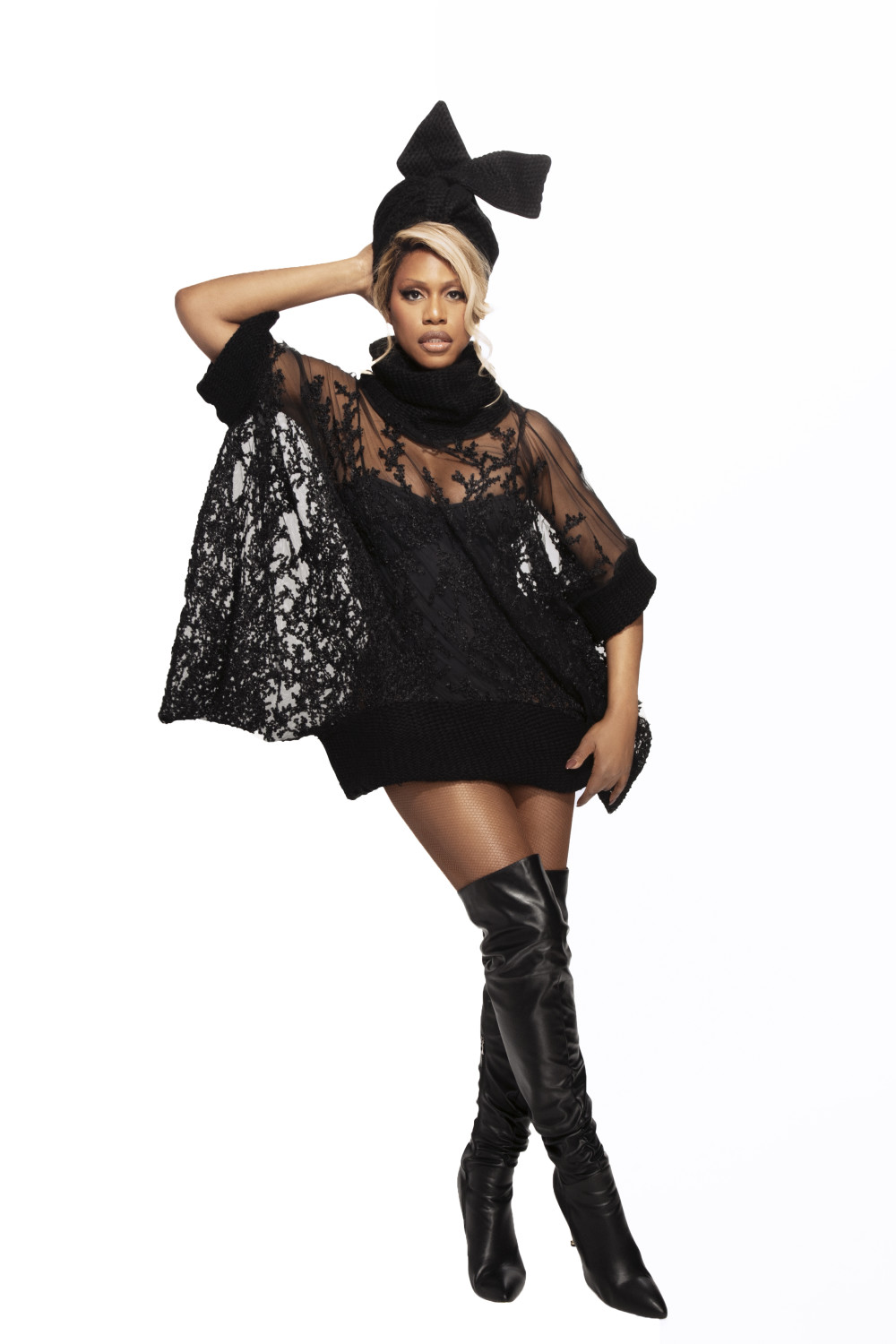

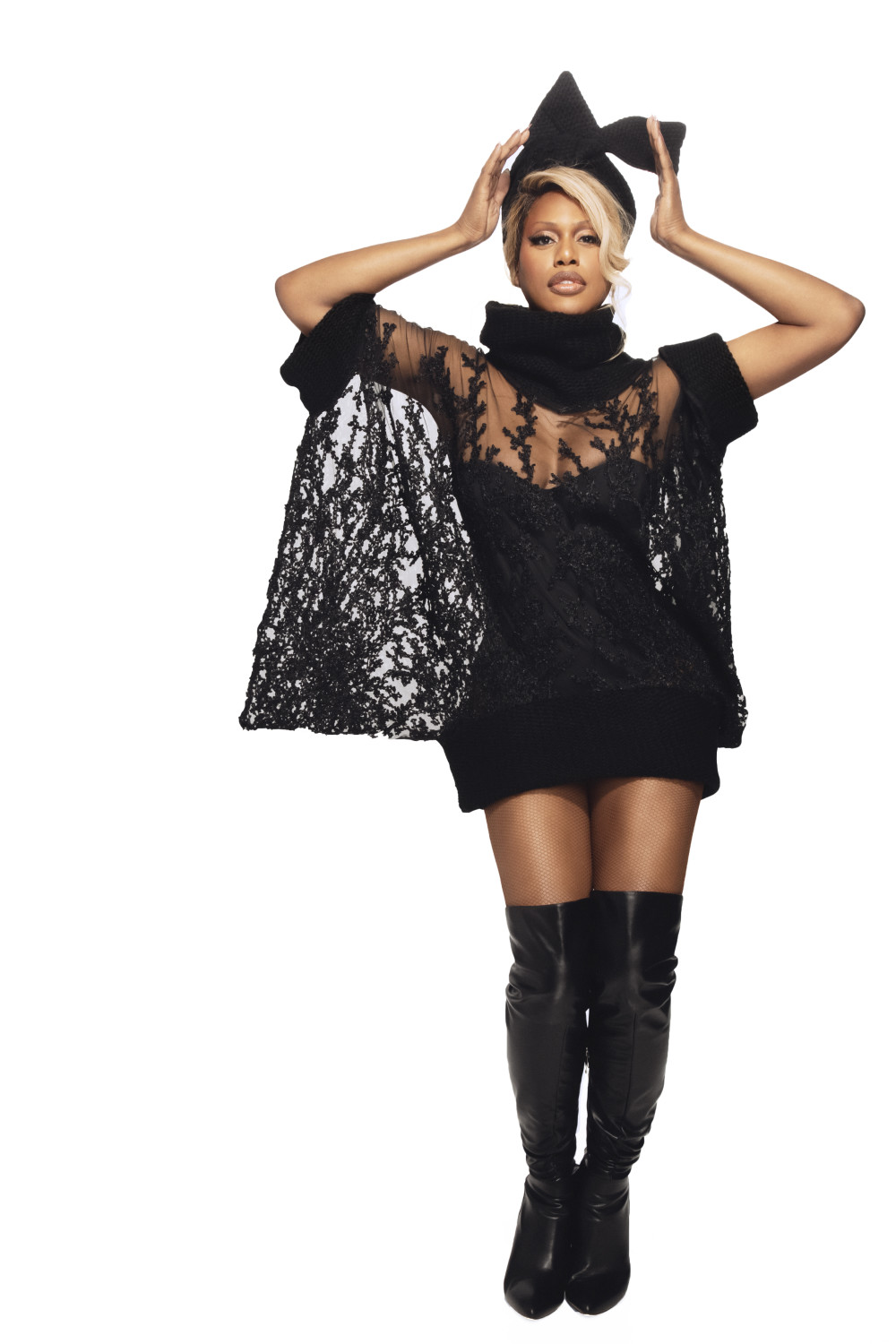
Kokin New York Headpiece; Cesar Galindo Blouse; Intimissimi Bodysuit; Nude Barre Hosiery.
TR: You're so good in your role as well-known fitness expert and life coach, Kacy Duke, in the Shondaland Netflix series, Inventing Anna, currently streaming, and people are obsessed. How did you prepare to play a real person, and for a storyline that has a timeline as recent as a couple of years ago?
"What was reaffirmed for me, is that often, not always, when someone is conned, it's because they themselves are trying to get something for nothing. It is because they have their own agenda. Almost everyone in Anna Delvey's life who became victims of hers had some sort of agenda, something they wanted to get because they believed she was a wealthy heiress and they want to be in proximity."
LC: Thank you. There was something exciting about it; I found Kacy immediately exciting. I found this video of her on YouTube where she talks about mindset, motivation, and movement, and the elements of fitness and her philosophy. I looked at her book called The Show It Love Workout. I was immediately fascinated by Kacy and became obsessed with her. I was lucky that there was a lot of video available on YouTube. She'd also done an interview for The Writers Room that was filmed that I was able to watch. I was able to meet her, and she trained me. I went to her building, had a training session, and then we had a four hour lunch where she told me her life story very intimately, very generously. What a life. What a woman. I found that a lot of things emotionally hit me, it was an emotional gut punch from her life. All of it was very useful for the character private moment, and also being on set and having script moments. Even though a lot of Kacy's personal history wasn't expressed in Inventing Anna, I was able to draw from it to play the character, and that is a wonderful gift. It was scary because a lot of people know her. I didn't want her to watch it and be like, 'Oh, my god. That's awful. This is so embarrassing.' Luckily, she loves it. She said I nailed it, and she did say, 'Laverne is a little more gangster sometimes that I am. I'm a little more gentle. But there's a little gangster in Kacy too. She's 66 years old, and she is a highly evolved, spiritual being. Kacy has a mantra for everything, Laverne kind of has a mantra for everything. There was a lot of organic overlap that had me thinking, I'm more like Kacy than I realized. Sometimes I watch her dancing on Instagram, and I'm like, 'Oh, my god. That's me.' Shonda Rhimes is brilliant for thinking of it, in retrospect. I was scared because she's a real person, so I'm so happy that she's happy. She sent me flowers after she saw the whole season and was so proud of me. She's very encouraging. She can't help but give love and encourage people, it's literally what she does for work, it is a calling for her.
"My brother played my character, Sophia, pre-transition. I wanted to play Sophia pre-transition, but Jodie Foster, who directed my backstory episode, and I guess, Jenji Kohan, didn't think I was butch enough to pull it off."
TR: Was there anything that you were surprised to discover, while working on this series? You became so close to this incredible story of deception and thievery in New York City.
LC: I don't know if I was surprised. What was reaffirmed for me, is that often, not always, when someone is conned, it's because they themselves are trying to get something for nothing. It is because they have their own agenda. Almost everyone in Anna Delvey's life who became victims of hers had some sort of agenda, something they wanted to get because they believed she was a wealthy heiress, and they want to be in proximity. People are defrauded in all sorts of situations but often that's the case. That was something interesting to reflect upon. I think our show invites you to think about accountability, I always like to remind people of that. Anna did some awful things, but there are people who've done things just as bad or worse, who've never seen the inside of a jail. The Wall street people who brought down the economy in 2008 with predatory lending and speculatory trading, not a single one of them went to jail. That was criminal behavior that ruined so many people's lives. I've mentioned former presidents who've done similar things.
TR: Inventing Anna is a Shondaland production. On the site, in our shoppable Inventing Anna article, Screened Style, we talk to longtime Shonda Rhimes collaborator and Inventing Anna costume designer Lyn Paolo, and production designer, Henry Dunn, about the visuals for the series. What do you think about when you think of Shonda Rhimes and a Shondaland production?
“I found that it was an emotional gut punch from her life. Kacy [Duke] has a mantra for everything, Laverne kind of has a mantra for everything. There was a lot of organic overlap that had me thinking, I'm more like Kacy than I realized.”
LC: First of all, I love Lyn so much. I went in with such enthusiasm and awe and excitement and reverence. I'm just a ginormous fan of all of Shonda's shows. I remember being my fittings, thinking, 'Oh my God, I'm getting to meet with Shonda.' I was so thrilled. I was like kid in a candy store, honestly. I felt so taken care of, I felt so cared for, in a way that is rare on set. Not that I've been treated badly, but there was an extra-special care that I think is important to note. Katie Lowes [who plays Rachel], became pregnant when we were on break, when production shut down because of the pandemic, and we basically just delayed. It was a beautiful thing. Katie had her baby, and Shonda gave her three or four months to just be with the baby and take her time to come back. For me, that's what it means to be in Shondaland, that kind of care and understanding for life, and that actors are also human beings who have lives, who deserve to have some time with their children. My podcast is also a production of Shondaland. I'm deeply honored that Shonda sees me. It means so much to me not just because of who she is, very influential and powerful in the business, but also because she's a genius storyteller, and a black woman who I deeply respect. I feel like she really sees me as an artist, as a thinker, as a human being. And that level of support from her is everything. It's deeply humbling. I would not have a career if it weren't for people like Shonda Rhimes and Jenji Kohan---mostly women---who have hired me and given me jobs over the years. I'm deeply, deeply grateful for them. And there were some men too. Some trans. NBC Universal has invested so much in me being their new red carpet host, and I'm so honored. I've made a lot of sacrifices, personal sacrifices, like my social life, a lot of things, so that nothing will stand in the way of me being my absolute best when it comes time for me to perform. I mean, you saw me on the set of Story + Rain---I don't phone it in. I'm pleased that so many powerful and influential people have invested in me and believe in me. And I want to return that generosity by giving 200 percent every time.
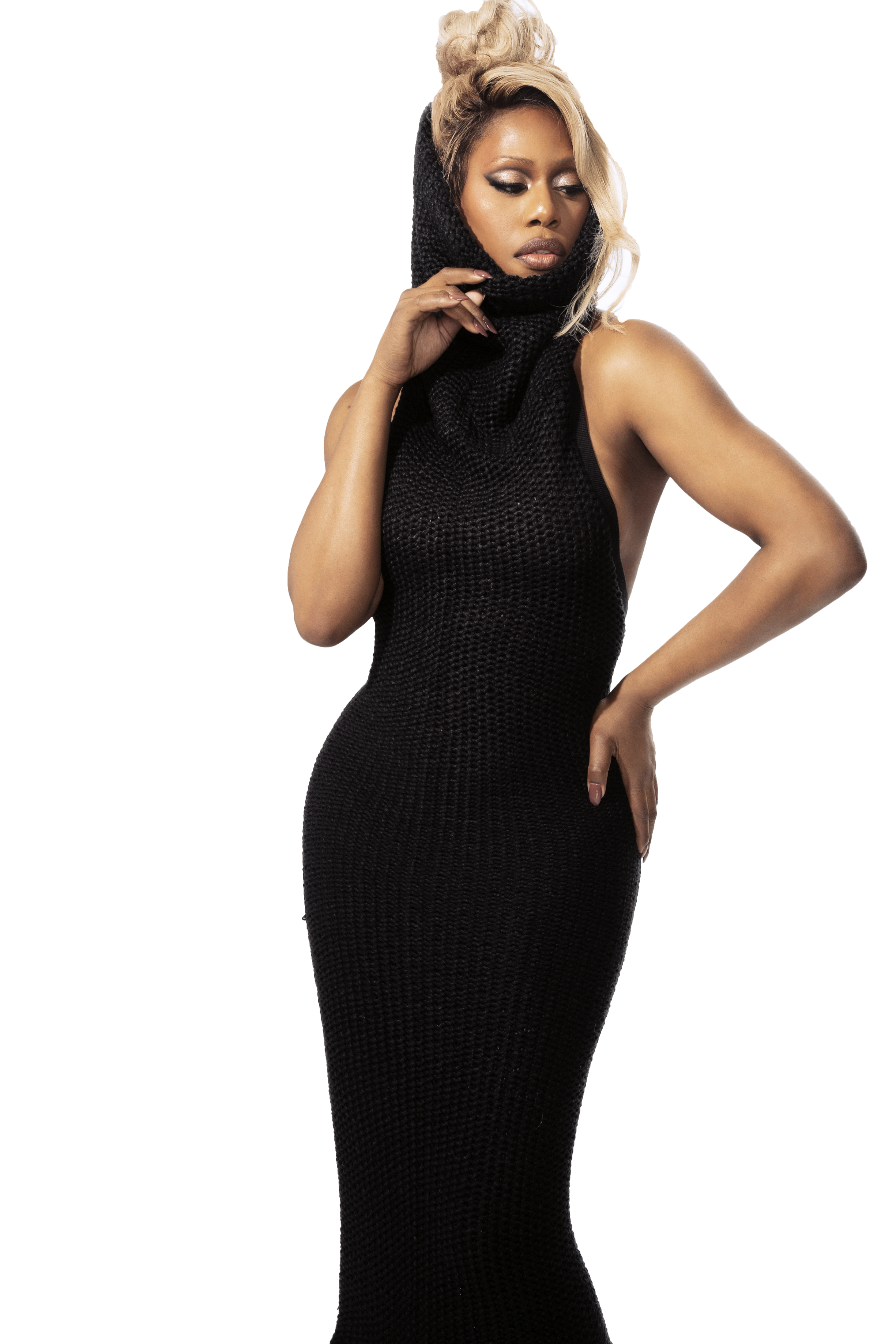
Cesar Galindo Dress.
TR: It was last March when you stepped into the role of host of Live from E!, partnering with the network to host the red carpet. What did they tell you they wanted from you, or what they hoped for you to bring?
"Anything can happen on the red carpet, and you're just kind of going with it.. So you have to be yourself, be in the moment, listening. Listening is key."
LC: They wanted Laverne. They wanted me to be myself, which is wonderful. In 2020, they asked me to host their countdown show, and I said yes; I had a blast, and there was no pressure. I had a really good time with the cohost, and I guess that inspired them to make the offer to me. When we think red carpet, we think about fashion. I love it and I have fun with it. I love pop culture. I love artists. I'm very curious. I love talking to people and getting in their business...I guess that's interviewing people! When I think about the Laverne that has always existed, the Laverne who used to dance in grocery stores when music would come on, imitate choreography, always singing, who developed an interest in feminist theory and queer theory in college...I allow all these aspects of who I am without shame or apology, that's what I've done today in this interview, and that's what I'm doing at E!, being myself. Ultimately it's about being of service to the network, to the artists that I talk to. It's really important for me as an artist myself to be respectful of artists, to be in reverence of what it takes to be an artist. To honor the artist is something that's really important to me. Anything can happen on the red carpet, and you're just kind of going with it. There's something thrilling about it because you're flying by the seat of your pants sometimes. So you have to be yourself, be in the moment, listening. The biggest thing is listening to the person in my ear, listening to the person handing me cards, listening to my stage manager, to the camera person, to the people I'm interviewing. Listening. Listening is key.
TR: What's next on your list of things to tackle? On set we talked a little about theater.
LC: I want to do theater. I just turned down a Broadway offer, a beautiful play. It was the hardest Broadway offer I've turned down, but there was just no time to do it. Theater has to come up at a time when I have the ability to drop everything. To do a play you have to drop everything, and I'm just too committed right now. So, eventually, theater. There's a music project that I really want to make happen. I've recorded some music and I want to release it, but I want to release it properly. God willing that'll happen. Again, that's contingent upon my regular jobs. No one's asking for it or paying me to do it. I'll probably lose money doing it, but it's something I want to do. I want to have fun and I want to have more balance in my life. I want to keep stretching myself, to keep playing fun roles as well as ones that are emotionally challenging. I love playing villains! I want to play more villains. I feel like I've only scratched the surface of what I'm capable of as an actor. I'm looking forward to plumbing the depths of my soul, my psyche, my traumas---for new characters in the future.
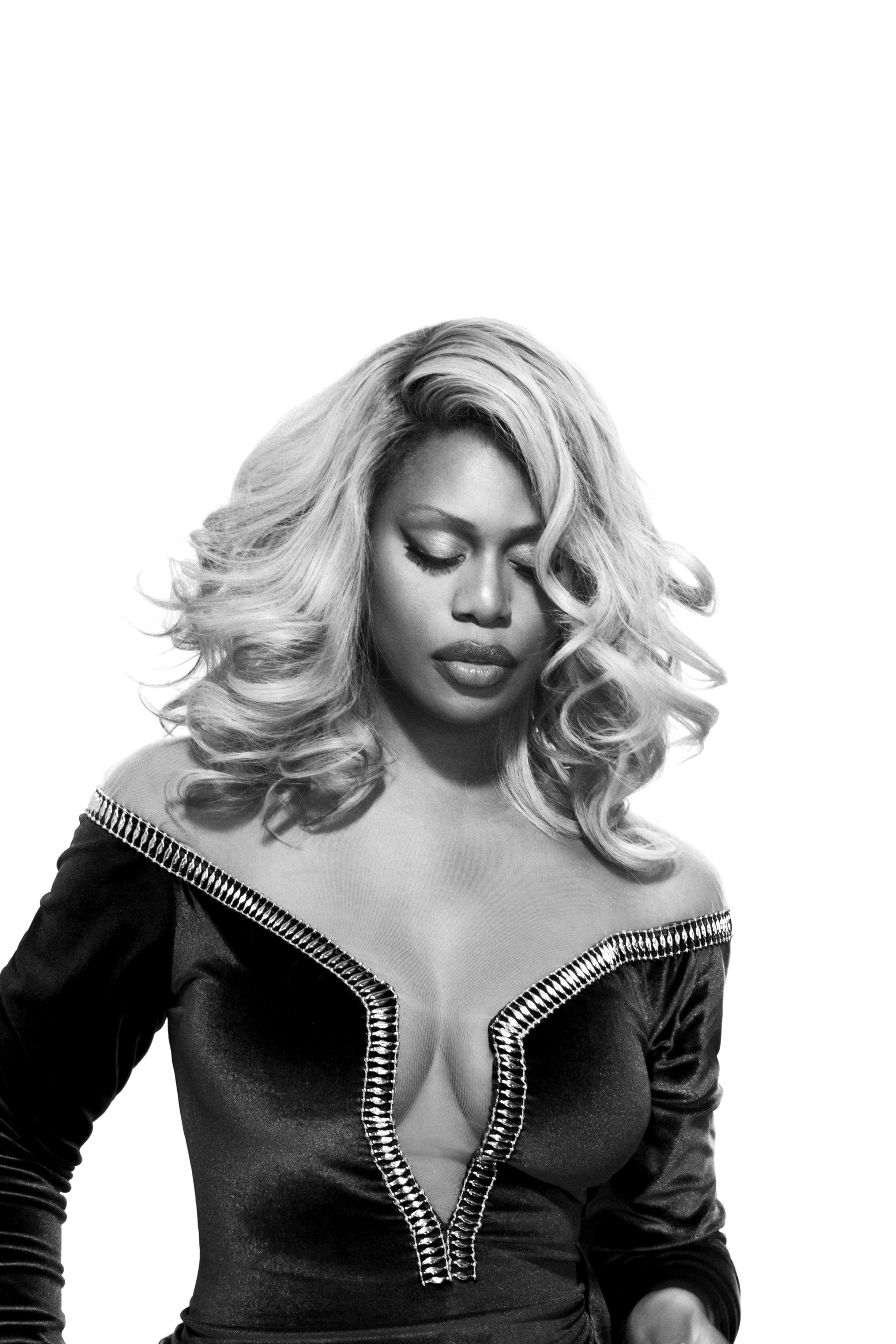
Adolfo Sanchez Gown
#BTS
MARCH 2022 COVER
LAVERNE COX
LOCATION 
PHOTOGRAPHER
MARC BAPTISTE
STYLIST
MEMSOR
HAIR
URSULA STEPHEN
A-FRAME
MAKEUP
KEITA MOORE
THE ONLY AGENCY
NAILS
ERI ISHIZU
OPUS BEAUTY
ASSISTANT: PHOTO: PAUL STORY, FASHION: KEENAN ENGLISH, HAIR: GABRIELLE HINTON
CATERING![]()
FLANNERY KLETTE-KOLTON
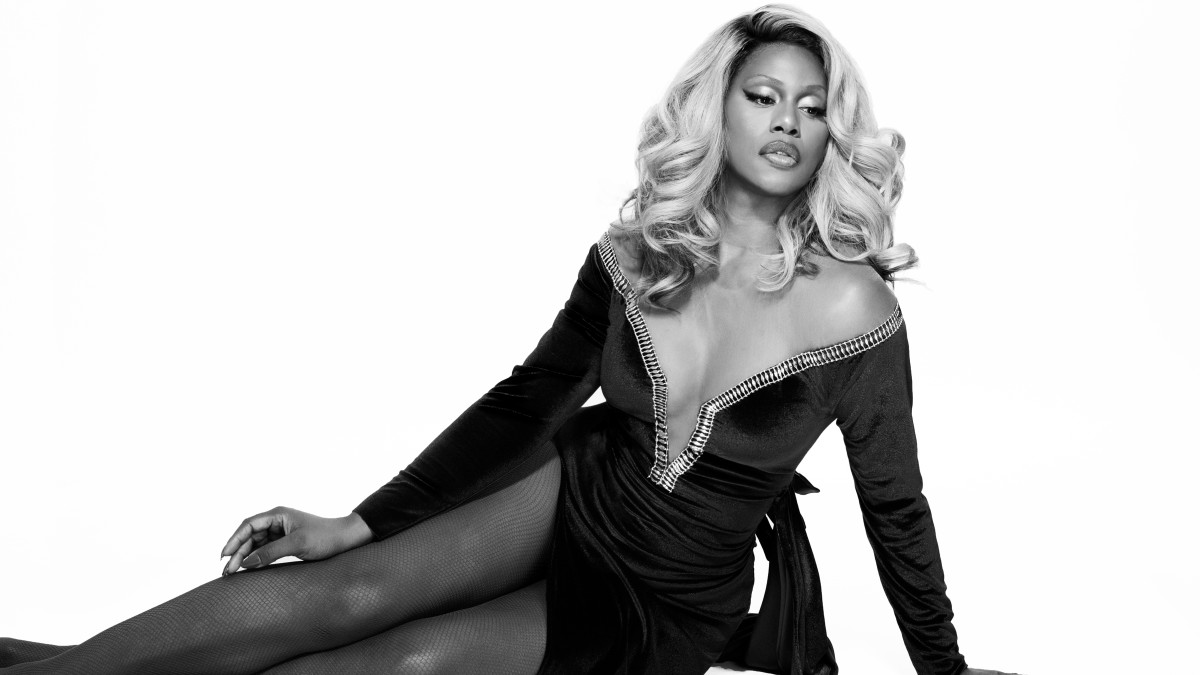
Catch Laverne Cox on Live From E! at the 2022 Oscars.
